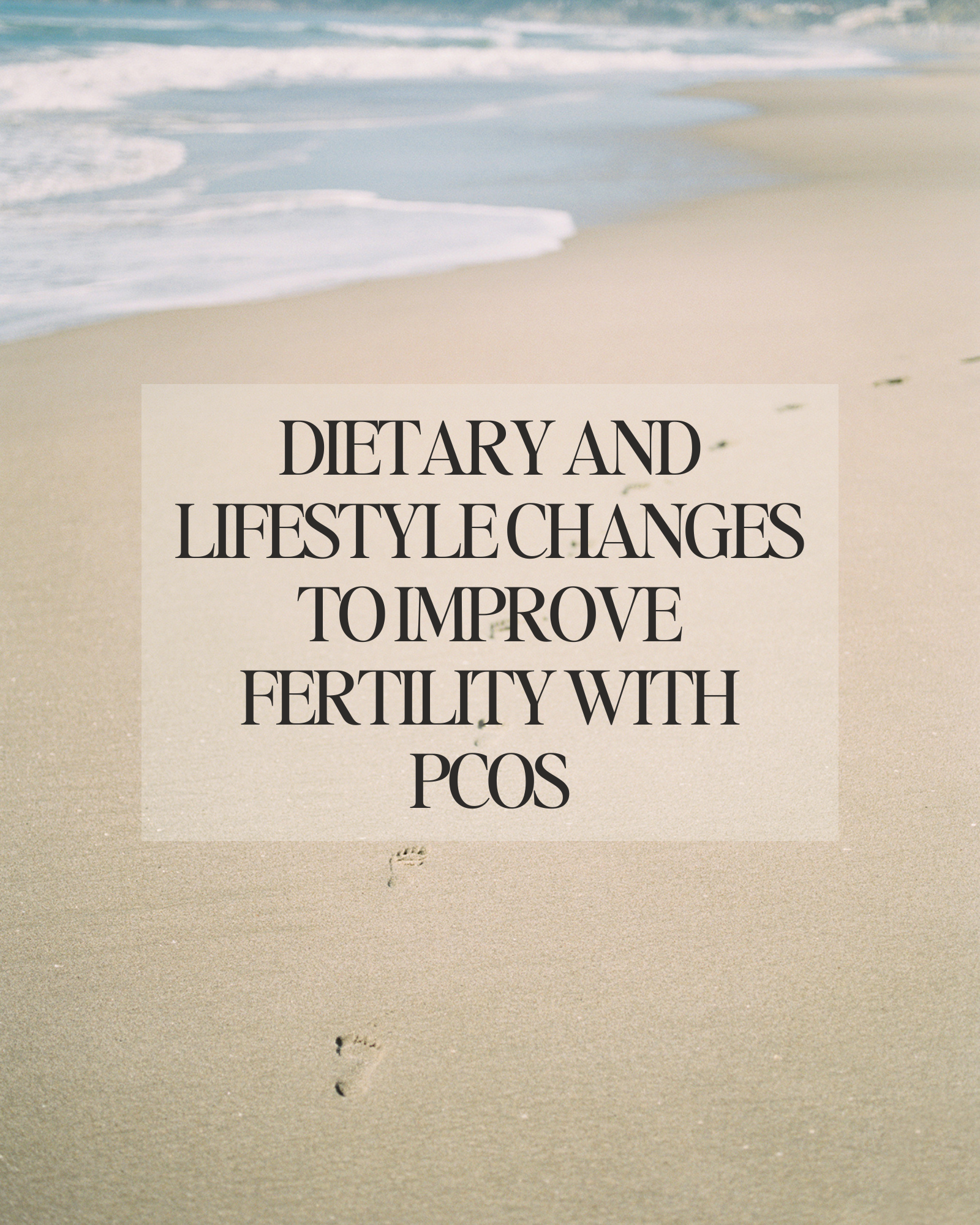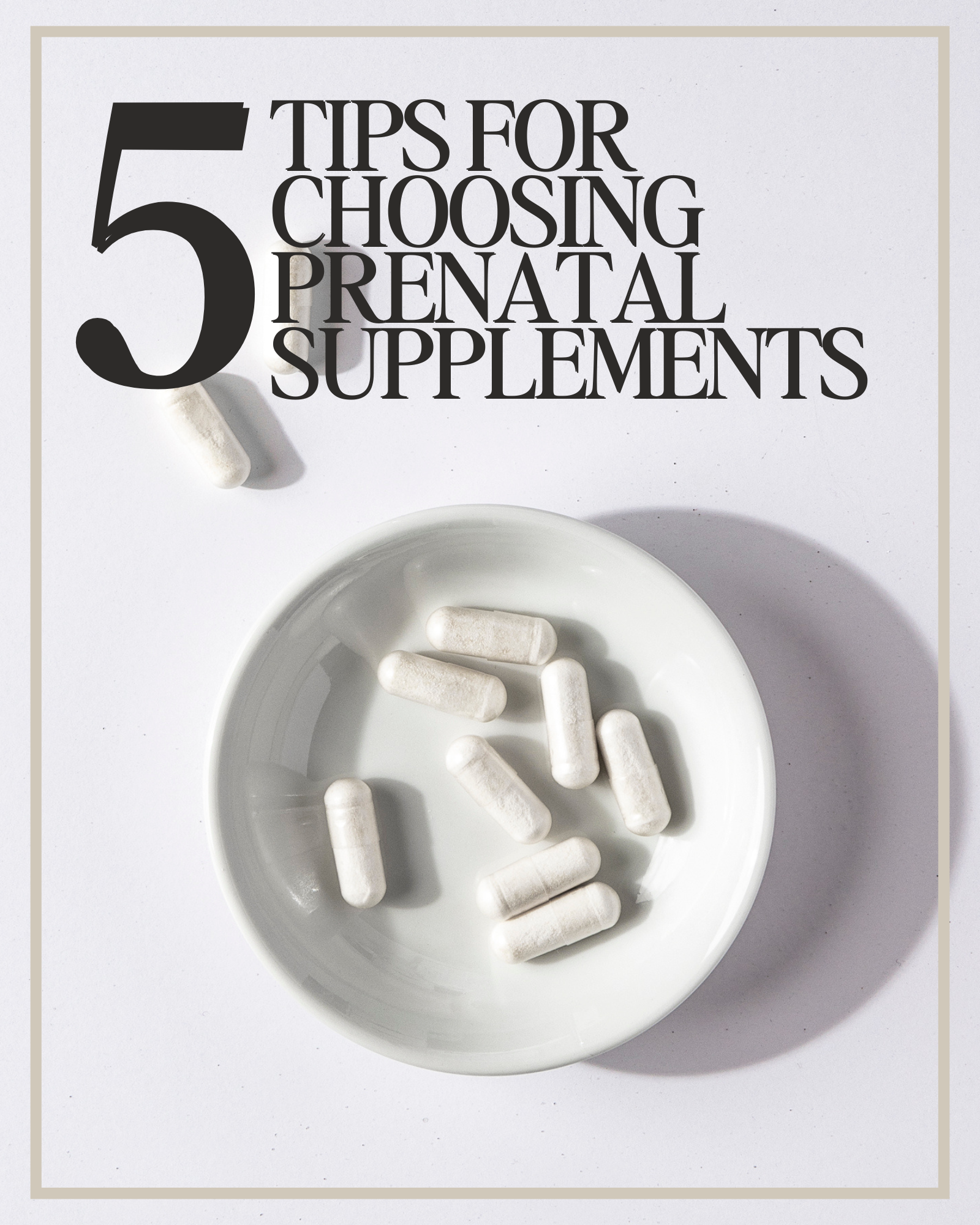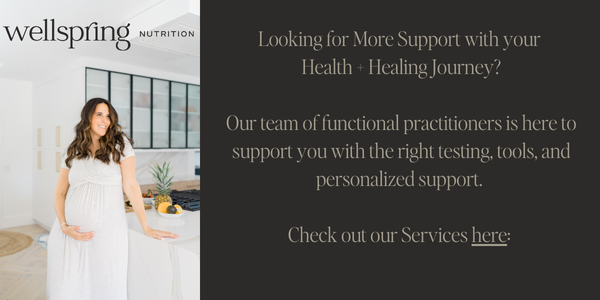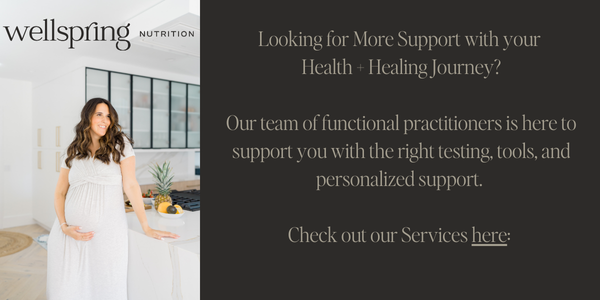Resources
Style
Planning
View All
THE blog
Many women with PCOS struggle to find an effective treatment plan due to its complex nature. However, recent research has begun to shine a light on the crucial role the gut microbiome plays in managing this condition. Your gut does more than just digest food; it influences hormone regulation, inflammation, and even your overall metabolic health.
This article dives into how optimizing your gut health can significantly impact PCOS management. From understanding the gut-hormone link to practical dietary changes you can make, you’ll gain valuable insights to improve your wellbeing.
Understanding PCOS: A Brief Overview
Polycystic Ovary Syndrome (PCOS) affects a significant portion of women around the world, with implications that go beyond just the reproductive system. At its core, PCOS is a hormonal disorder known for causing irregular menstrual cycles, excess androgen levels, and polycystic ovaries. But, it doesn’t stop there. This complex condition often brings a host of other challenges, including insulin resistance, obesity, type 2 diabetes, and cardiovascular issues.
The exact cause of PCOS remains a subject of ongoing research, but genetics and lifestyle factors both appear to play substantial roles. Women with PCOS frequently exhibit elevated insulin levels, which can exacerbate symptoms and contribute to the imbalance of sex hormones. What’s more, the syndrome can profoundly impact mental health, leading to conditions like anxiety and depression.
With no known cure, managing PCOS involves a combination of lifestyle modifications, dietary adjustments, and medical treatments tailored to alleviate specific symptoms. Because PCOS affects different women in different ways, it’s crucial to approach treatment on an individualized basis. In recent years, emerging studies have started to explore the connection between gut health and PCOS, revealing that a balanced gut microbiome might be an essential key to managing this disorder.

The Gut-Health Connection: Why It Matters
Your gut health doesn’t just affect your digestion; it has a profound impact on your overall well-being. The human gut microbiome, an ecosystem of trillions of bacteria, fungi, and other microorganisms, plays a crucial role in many bodily functions. Notably, it helps regulate metabolism, supports the immune system, and maintains the structural integrity of the gut lining.
But the relationship between gut health and conditions like Polycystic Ovary Syndrome (PCOS) is particularly interesting. The gut-brain axis, a complex communication network that links your gut and brain, further illustrates this connection. When your gut microbiota is in balance, it positively influences hormonal health, which is central to managing PCOS symptoms.
Emerging research highlights how an imbalance in the gut microbiota, also known as dysbiosis, can exacerbate PCOS symptoms. Dysbiosis has been linked to increased inflammation, insulin resistance, and hormonal imbalances—all of which are critical factors in PCOS. This makes maintaining a healthy gut not just a recommendation, but a necessity for those managing PCOS.
Moreover, factors like diet, sleep, and exercise play a significant role in shaping your gut microbiome. Consuming a diet rich in diverse, fiber-rich foods, getting quality sleep, limiting alcohol intake, and engaging in regular physical activity can all foster a healthier gut. By focusing on these areas, you can support your gut health and, in turn, help manage PCOS more effectively.
How Gut Bacteria Influence Hormonal Balance
In understanding gut health’s role in PCOS, it’s essential to dive into the relationship between gut bacteria and inflammation. Gut microbiota plays a crucial role in regulating hormones and metabolism. When your gut microbiota is unbalanced, it can lead to chronic inflammation, a common issue in those with PCOS. But how exactly does this happen?
Your gut lining serves as a barrier, preventing harmful substances from entering your bloodstream. However, an imbalanced gut microbiota can weaken this barrier, allowing toxins and bacteria to escape into your system. This phenomenon, known as “leaky gut,” triggers your immune system to react, leading to chronic inflammation.
This inflammation doesn’t just stay localized in your gut. It can spread throughout your body, affecting various organs and tissues, including your ovaries. Chronic inflammation can exacerbate the symptoms of PCOS by disrupting your hormonal balance. For example, inflammation can impair insulin signaling, leading to insulin resistance – a hallmark of PCOS.
Moreover, hyperandrogenism, or elevated levels of male hormones, is closely linked to gut health. Research indicates that your gut microbiota can influence sex hormone production. In those with PCOS, an imbalanced gut microbiota may contribute to increased testosterone levels, worsening symptoms like excess hair growth, acne, and menstrual irregularities.
Addressing inflammation through gut health can be a powerful strategy. By focusing on a diet rich in anti-inflammatory foods, you can help restore balance to your gut microbiota. Probiotics, prebiotics, and other dietary supplements may also play a vital role in reducing inflammation and supporting a healthier hormonal balance.
The Role of Inflammation in PCOS and Gut Health
Chronic inflammation is a known factor in the development of PCOS. Chronic inflammation is a hallmark of PCOS, often linked to an imbalance in gut microbiota. When your gut bacteria are out of balance, it can lead to increased intestinal permeability, commonly known as “leaky gut.” This condition allows toxins and partially digested food particles to enter the bloodstream, triggering an immune response and chronic inflammation.
This persistent inflammation can exacerbate insulin resistance, a common feature in PCOS. Insulin resistance leads to elevated blood sugar levels, which in turn can cause the body to produce more insulin. High insulin levels stimulate the ovaries to produce more androgens, contributing to symptoms such as irregular menstrual cycles, acne, and hirsutism.
Moreover, chronic inflammation influences ovarian function and insulin sensitivity through various biochemical pathways. For instance, certain inflammatory markers like IL-22 have been shown to affect ovarian granulosa cells, which are crucial for hormone production and ovarian health. Inflammatory cytokines can also disrupt the normal functioning of the ovaries, potentially worsening PCOS symptoms.
It’s also worth noting that Vitamin D deficiency, commonly observed in PCOS patients, can further exacerbate inflammation. Vitamin D has anti-inflammatory properties, and its lack can lead to an increase in inflammatory responses, thereby worsening both gut health and PCOS symptoms. It is also known that Women with PCOS often have altered gut microbiota compared to those without PCOS.
Given this intricate relationship, addressing inflammation by improving gut health can be a promising approach to managing PCOS. Incorporating anti-inflammatory foods, probiotics, and dietary changes can help maintain a balanced gut microbiota, reduce intestinal permeability, and ultimately mitigate the inflammatory processes that contribute to PCOS.
Recognizing the Signs of Poor Gut Health
Recognizing the signs of poor gut health is crucial in managing PCOS effectively. You might wonder what symptoms to look out for. Here’s a quick guide to help you identify potential gut issues:
- Digestive discomfort: Frequent bloating, gas, diarrhea, or constipation could indicate an imbalance in your gut microbiota.
- Food intolerances: If you notice increased sensitivity to certain foods, it might be linked to gut health issues.
- Fatigue: Chronic tiredness can be a sign that your gut is not absorbing nutrients properly.
- Skin conditions: Issues like eczema or acne can be linked to gut health, as inflammation in the gut often manifests on the skin.
- Mood changes: An unbalanced gut microbiota can lead to abnormal hormone changes, potentially contributing to anxiety and mood swings.
- Unintentional weight changes: Both weight gain and loss without any obvious reason can indicate a gut health problem.
It’s important to be attentive to such signs because they can be early indicators of more significant issues. If you experience any of these symptoms consistently, it might be time to take a closer look at your gut health, especially if you have PCOS.
Dietary Changes to Boost Gut Health for PCOS
Making the right dietary choices can significantly influence your gut health and, by extension, help manage symptoms of PCOS. Let’s delve into some practical and effective changes you can implement.

1. Incorporate Fiber-Rich Foods
Fiber acts as fuel for the beneficial bacteria in your gut. Eating a diet rich in fruits, vegetables, whole grains, and legumes can support these bacteria, which in turn helps regulate hormones and reduce inflammation. Aim to include at least 25-30 grams of fiber daily.
2. Add Fermented Foods

Fermented foods such as yogurt, kefir, sauerkraut, kimchi, and kombucha are brimming with probiotics. Regularly consuming these foods can help restore and maintain a healthy gut microbiota, crucial for managing PCOS symptoms. Probiotics, like bifidobacterium lactis V9, in particular, have shown promising results in improving gut health for women with PCOS.
3. Focus on Prebiotics
Prebiotics are non-digestible food ingredients that promote the growth of beneficial bacteria. Foods like garlic, onions, bananas, asparagus, and oats are excellent prebiotic sources. Integrating these into your diet can help nurture a healthy gut environment. Probiotics and prebiotics can positively influence gut microbiota.
4. Opt for Healthy Fats
Healthy fats, particularly those from omega-3 fatty acids, can reduce inflammation and support overall gut health. Include sources such as fatty fish (salmon, mackerel), flaxseeds, chia seeds, and walnuts in your meals to reap their benefits.
5. Minimize Processed Foods and Sugars
Highly processed foods and sugary snacks can promote harmful bacteria growth and contribute to gut dysbiosis. Steering clear of these foods can help maintain a balanced gut microbiome, which is crucial for managing PCOS effectively.
By making these dietary adjustments, you can create a supportive environment for your gut health, potentially alleviating some of the hormonal and metabolic challenges associated with PCOS. Remember, small, consistent changes can lead to significant improvements over time.
Supplements That Support Gut Health in PCOS
Supplements can play a significant role in supporting gut health, particularly for women managing PCOS. Integrating the right supplements into your routine can help rebalance your gut microbiota, leading to improved overall health.

Probiotics
One of the most well-researched supplements for gut health is probiotics. Strains like Bifidobacterium lactis V9 have shown promise in improving gut health in women with PCOS. Probiotics can help restore the natural balance of gut bacteria, which in turn may enhance metabolic and reproductive functions. One of our favorites is Megaspore biotic – which you can find inside our supplement store right here.
Prebiotics
Prebiotics are another cornerstone of gut health. These are non-digestible fibers that fuel the growth of beneficial bacteria in your gut. Incorporating prebiotic supplements can create a more favorable environment for your gut microbiota, helping to improve hormonal balance and reduce inflammation, both crucial for managing PCOS.
Synbiotics
Combining probiotics and prebiotics, synbiotics offer dual benefits. By taking these supplements, you provide your gut with beneficial bacteria while ensuring they have the nutrients they need to thrive. This synergistic approach can be particularly effective for restoring gut microbiota diversity and improving PCOS symptoms.
Vitamin D
Emerging research suggests that Vitamin D might influence the occurrence of PCOS by affecting the composition of gut microbiota. Vitamin D supplementation could improve gut health and potentially alleviate some symptoms of PCOS by enhancing the microbiota balance. *It’s important to test vitamin D levels before supplementing, as you can go *too high* with this as well.
Getting Support with Your Gut Health and PCOS
If you’re looking for more support with managing your PCOS, improving your gut health, and preparing your body for a healthy pregnancy, reach out to our team of highly trained functional fertility nutritionists.
We utilize functional lab testing such as the GI MAP, to help uncover the root cause of your fertility struggles. We’ve worked with hundreds of women in our practice, and are here to support you!

Polycystic Ovary Syndrome (PCOS) is a condition that can significantly affect a woman’s health and fertility, but diet plays a crucial role in managing its symptoms. For many women, questions arise about the impact of dairy on their condition. Contrary to popular belief, consuming dairy may not be harmful and can even offer benefits. Recent studies suggest that incorporating certain types of dairy could support hormonal balance and improve fertility. Let’s explore how you can make dairy work for you if you’re navigating life with PCOS.
The Role of Diet in Managing PCOS
Your diet has a profound impact on managing Polycystic Ovary Syndrome (PCOS). Maintaining a balanced and nutritious diet not only helps to alleviate symptoms but also supports overall well-being. One of the primary goals in managing PCOS through diet is stabilizing insulin levels, as insulin resistance is a common issue among women with this condition.
Dairy and Hormonal Balance: What You Need to Know
When discussing hormonal balance and PCOS, dairy often comes under scrutiny. However, it’s important to understand that no single dietary choice universally affects every woman in the same way. Dairy has gotten a bit of a bad rap in the realm of hormonal health, but recent research sheds a more nuanced light on its role, and probably let you to ask the question at some point: Can I eat dairy with PCOS?
The Hormonal Connection: Some studies suggest that dairy can influence hormone levels due to the presence of natural hormones in milk. Yet, this impact may not necessarily be negative. For instance, certain high-fat dairy products, like full-fat yogurt and cheese, contain beneficial nutrients that support hormonal balance. These include calcium, vitamin D, and various bioactive compounds that may aid in regulating your menstrual cycle and improving overall fertility. Dairy products provide essential nutrients like calcium, vitamin D, and protein, which are beneficial for reproductive health.
Additionally, dairy is a valuable source of protein, which plays a key role in managing blood sugar levels and insulin sensitivity – crucial aspects for women with PCOS. According to some findings, consuming high-fat dairy could enhance insulin sensitivity and promote more stable glucose levels, potentially mitigating some PCOS symptoms.
One study highlighted by Gunther et al. categorized 155 women by their dairy intake and observed lower fat accumulation in those with higher dairy consumption over a six-month follow-up period. This suggests that, for some, dairy might contribute to better weight management, another crucial factor for hormonal health.
To maximize the benefits, it’s advisable to opt for organic, pasture-raised, and whole-fat dairy products. These options minimize exposure to synthetic hormones and preservatives, offering a cleaner source of nutrition.
While dairy’s effects can vary based on individual tolerance and physiology, incorporating it mindfully might just provide the hormonal harmony you need for better fertility outcomes.
Recent Studies on Dairy and Fertility in Women with PCOS

Recent research has highlighted the potential benefits of dairy consumption for women with PCOS, especially concerning fertility. A study conducted at Shahid Beheshti hospital clinic in 2013 involving 400 women explored the relationship between dairy intake and PCOS. The results were intriguing, suggesting that women who consume dairy products may experience fewer PCOS symptoms and improved fertility outcomes. High-fat dairy consumption is actually associated with a 27% lower risk of ovulatory infertility
Historically, the influence of dairy products on female fertility and ovulation has drawn considerable interest. Numerous studies have pointed toward a positive correlation, particularly with full-fat dairy products. These products, laden with healthy fats, can help regulate blood sugar levels, which is crucial for women with PCOS.
Interestingly, a prospective study examining dairy food intake and anovulatory infertility found that incorporating full-fat dairy into the diet may reduce the risk of this type of infertility. This is a significant finding, as anovulatory infertility is one of the primary reproductive challenges women with PCOS face. (Article: Women who consume full-fat dairy products have a 25% lower risk of infertility due to anovulation)
However, the existing body of research is not without its inconsistencies. While several studies suggest beneficial effects, others call for more comprehensive, randomized clinical trials to conclusively determine the impact of dairy on PCOS and related conditions like Type 2 Diabetes Mellitus (T2DM). Despite these inconsistencies, the overall trend appears promising.
Including dairy products in your diet could indeed be advantageous if you have PCOS. Many experts now advocate for the integration of milk and dairy products into the dietary plans of women with PCOS due to their beneficial effects on diabetes risk and their neutral or positive effects on ovulation and fertility.
Types of Dairy That May Boost Fertility
If you’re considering adding dairy to your diet to potentially boost fertility, it’s essential to choose the right types. According to research, full-fat dairy products may provide more benefits compared to their low-fat and fat-free counterparts. The higher fat content in full-fat dairy aids in better blood sugar regulation, a crucial factor for women with PCOS.
For starters, whole milk is an excellent option. Studies have indicated that consuming whole milk, rather than skim or low-fat versions, can significantly reduce the risk of ovulatory infertility. This is due to the presence of beneficial fatty acids that may enhance ovarian function.
Next, consider incorporating whole milk yogurt. Not only does it offer probiotic benefits for gut health, but it’s also packed with essential nutrients that support hormonal balance, such as calcium, magnesium, and vitamin D.
Organic full-fat cheese is another dairy product that may be beneficial. Rich in essential fats, vitamins, and protein, organic cheese can be a delicious and nutritious way to support your fertility journey. Remember to opt for organic versions to avoid potential hormonal disruptors found in non-organic dairy products.
Don’t forget about butter and cream. These often-overlooked dairy products can be healthful additions to your diet in moderation. They provide high-quality fats that are essential for maintaining hormonal health and improving the body’s insulin sensitivity, which is particularly important for managing PCOS symptoms.
Additionally, raw milk has been a subject of interest in various health and nutrition studies. One of the primary benefits often cited is its rich content of natural enzymes and probiotics. These enzymes, such as lactase, can aid in the digestion of lactose, potentially making raw milk easier to digest for some individuals who are lactose intolerant.
In summary, focusing on full-fat, organic dairy products like whole milk, yogurt, cheese, butter, and cream could be a strategic move in improving fertility outcomes for women with PCOS. However, always remember to monitor your body’s response and consult with a healthcare professional to tailor dietary choices to your specific needs.
How Much Dairy Should You Eat?
Determining the right amount of dairy can be a balancing act, especially when managing PCOS. Research suggests that moderate dairy consumption may benefit women with PCOS. For example, studies have indicated that consuming around 2.6 servings of dairy per day could lower the risk of type 2 diabetes by 21%. Additionally, another study reported a 30% lower risk when consuming 1.9 servings of low-fat dairy products daily.
But how do you translate this into your daily diet? A serving of dairy can be one cup of milk, one cup of yogurt, or around 1.5 ounces of cheese. Integrating these servings into your meals can be simple and enjoyable. Imagine starting your day with a yogurt parfait, using milk in your morning coffee, or adding a slice of cheese as a snack.
It’s crucial to choose the right type of dairy. Opt for organic, pasture-raised, and whole-fat products whenever possible, as these tend to have higher nutritional value. However, balance is key. Overconsumption of any food group can lead to unintended consequences, so moderation is essential. Aim to observe how your body responds to different amounts of dairy and adjust accordingly.
Lastly, while these guidelines can help you get started, remember to personalize your diet. Consulting with a dietitian or healthcare provider can provide tailored advice that aligns with your unique health profile and fertility goals. Regular check-ins will also help you monitor any changes or improvements, ensuring that your diet supports your overall well-being.
Myths and Facts About Dairy Consumption with PCOS

When it comes to dairy and PCOS, there is a whirlwind of myths that can leave you feeling confused. It’s important to separate fact from fiction to make informed choices that best support your health and fertility.
Myth: Dairy should be completely avoided if you have PCOS.
Fact: While some women may find that dairy exacerbates their symptoms, it is not a universal rule. Many women with PCOS can consume dairy without adverse effects. In fact, some studies suggest that full-fat dairy can be beneficial for hormonal balance and fertility.
Myth: Low-fat dairy is always the healthier choice.
Fact: Research indicates that full-fat dairy products may actually be more favorable for women with PCOS. The higher fat content helps with blood sugar regulation and may support overall hormonal balance, which can positively impact fertility.
Myth: All dairy products affect insulin resistance the same way.
Fact: Different types of dairy can have varying impacts on insulin resistance. While some studies suggest that low-fat dairy might exacerbate insulin resistance, other research shows that fermented dairy products like yogurt may reduce the risk of type 2 diabetes in women with PCOS. It’s essential to consider the type of dairy you’re consuming.
Myth: Dairy alternatives are always better than traditional dairy.
Fact: Dairy-free alternatives may not always be the healthier option. Some of these products can contain high amounts of added sugars or artificial sweeteners, which could worsen PCOS symptoms. Reading labels and choosing products with minimal additives is crucial.
By distinguishing facts from myths, you can craft a more effective dietary plan that aligns with your health goals and supports your journey with PCOS.
Monitoring Your Body’s Response to Dairy
Monitoring how your body responds to dairy is crucial when managing PCOS. Start by paying close attention to any immediate physical changes post-consumption. Symptoms like bloating, gas, and changes in bowel habits can be telltale signs of how your body is reacting. Additionally, a thorough self-check for skin issues, such as acne or rashes, can provide valuable insights.
Remember, everyone’s body responds differently to food. Finding the right balance takes time and patience, but understanding your individual response to dairy can play a significant role in managing PCOS effectively and potentially improving fertility outcomes.
Key Takeaways:
- Dairy can be beneficial: Emerging research suggests that consuming dairy may have positive effects on fertility for women with PCOS.
- Types of dairy matter: Opt for low-fat or fermented dairy products such as yogurt and kefir, which may offer more benefits.
- Monitor your intake: While dairy can help, moderation is key. Aim for balanced portions that fit into your overall dietary plan.
- Listen to your body: Pay attention to how your body reacts to different types of dairy. What works for one person may not work for another.

Polycystic Ovary Syndrome (PCOS) affects millions of women worldwide, often making the journey to conception a challenging one. If you’re navigating the complexities of PCOS, understanding the role of insulin resistance is crucial not just for managing symptoms but also for enhancing your fertility naturally. This comprehensive guide aims to illuminate the connection between PCOS and insulin resistance, offering practical dietary and lifestyle tips to help you take control of your health.
A journey of a thousand miles begins with a single step. Let’s start with understanding how insulin resistance impacts PCOS.
- Types of PCOS
- What is Insulin Resistance?
- Causes of Insulin Resistance in PCOS
- Symptoms of Insulin Resistance
- Dietary Tips for Managing Insulin Resistance
- Which Labs to Request when you have PCOS
- Conclusion
Types of PCOS
There are four different types of PCOS. Each type comes with its own set of challenges and requires tailored management strategies.
- Insulin-Resistant PCOS: This is the most common type and is characterized by significant insulin resistance, leading to high insulin levels. Managing this type involves focusing on improving insulin sensitivity through diet and lifestyle changes.
- Inflammatory PCOS: Women with this type often experience symptoms like unexplained fatigue, skin issues like eczema or psoriasis, and elevated levels of inflammation markers. Anti-inflammatory diets and stress management techniques can be particularly beneficial.
- Adrenal PCOS: This type is linked to an abnormal stress response, leading to elevated levels of DHEA-S, a hormone produced by the adrenal glands. Stress reduction techniques and targeted dietary changes are crucial for managing this type.
- Post-Pill PCOS: Some women experience PCOS-like symptoms after discontinuing birth control pills. This type often resolves on its own, but meanwhile, focusing on hormonal balance and liver health can help.
Understanding which type or combination of types of PCOS you have can significantly impact your fertility treatment plan. It’s essential to work with a healthcare provider to determine your specific type and develop a personalized strategy.
Okay, so let’s dive into the first one: insulin-resistant PCOS. Up to 70% of women with PCOS have insulin resistance, so this tends to be the one we focus on the most in our practice. But really, all women should be concerned with blood sugar management when trying to conceive.
What is insulin resistance?
Insulin resistance is a condition where your body’s cells become less responsive to the hormone insulin. This means that the glucose in your blood isn’t efficiently absorbed into your cells, leading to higher blood sugar levels. For women with PCOS, this can be particularly problematic, as insulin resistance can exacerbate many of the symptoms associated with the syndrome.

In simple terms, when you eat, your body breaks down carbohydrates into glucose, which is the main source of energy for your cells. Insulin, produced by the pancreas, helps transport this glucose into your cells. When you have insulin resistance, your cells don’t respond effectively to insulin, so your pancreas produces more insulin to compensate. This can lead to a myriad of issues, including weight gain and difficulty losing weight, two common problems associated with PCOS.
The relationship between PCOS and insulin resistance is complex. Though insulin resistance is commonly linked to obesity, it can also occur in women with PCOS who are lean. Research has shown that the mechanism of insulin resistance in PCOS differs from that seen in individuals with type 2 diabetes, suggesting unique cellular and receptor abnormalities.
It’s crucial to address insulin resistance not only to improve your fertility but also to reduce the risk of developing other long-term health issues like type 2 diabetes and cardiovascular diseases. Therefore, understanding and managing insulin resistance through diet, exercise, and possibly medications such as metformin is vital for anyone dealing with PCOS.
Causes of Insulin Resistance in PCOS:
This debilitating condition isn’t only limited to those struggling with weight issues; it affects lean women as well. Insulin resistance in PCOS involves a complex interplay between hormones and metabolic processes.
In many cases, the body’s cells become less responsive to insulin, forcing the pancreas to produce more of this hormone to compensate. This condition, known as compensatory hyperinsulinemia, exacerbates the hormonal imbalances already present in PCOS, contributing to an increase in androgen levels. Elevated androgens can lead to several of the symptoms associated with PCOS, such as irregular menstrual cycles, acne, and excessive hair growth.
Understanding the underlying causes and identifying symptoms can help you take targeted steps to manage them effectively. Research has shown that regardless of body mass index, the unique cellular mechanisms and insulin receptor functions in women with PCOS are inherently different.
It’s essential to recognize these differences to tailor appropriate lifestyle and dietary modifications that can help regain control over your insulin levels and improve your overall reproductive health. Taking proactive steps can make a significant difference in managing both PCOS and insulin resistance.
Symptoms of Insulin Resistance:
Recognizing the symptoms of insulin resistance can be a crucial step in managing PCOS effectively. Often, these symptoms overlap with those of PCOS, making it essential to pay close attention to your body and how it responds to different situations and dietary choices.
Common symptoms of insulin resistance include:
- Increased hunger and cravings, particularly for sugary or carbohydrate-rich foods
- Weight gain, especially around the abdomen, despite no significant changes in diet or lifestyle
- Fatigue or feeling overly tired, even after adequate rest
- Difficulty losing weight, even with diet and exercise efforts
- Dark, velvety patches of skin, often found on the neck, armpits, or groin area, known as acanthosis nigricans
- Frequent or increased need to urinate
- Increased thirst
If you notice these symptoms, it’s important to speak with your healthcare provider. Early diagnosis and management can help mitigate the risk of associated conditions, such as type 2 diabetes. Testing for insulin resistance typically involves blood tests to measure fasting blood glucose and insulin levels. Other tests, like the oral glucose tolerance test (OGTT), may also be utilized to get a comprehensive understanding of your body’s insulin response.
Understanding these symptoms and seeking timely medical advice can empower you to take control of your health and make informed decisions about your lifestyle and dietary choices.
Dietary Tips for Managing Insulin Resistance
In our private practice, we work with many women with PCOS. In fact PCOS is the leading cause of fertility struggles among women. 70-80% of women with PCOS experience infertility. Luckily, there are ways to manage PCOS and insulin resistance, and still go on to have a healthy pregnancy.
One of the cornerstones of managing PCOS and improving fertility is understanding and addressing insulin resistance. Insulin resistance plays a significant role in how PCOS affects your body, contributing to issues like weight gain, irregular menstrual cycles, and difficulty with ovulation. By focusing on lifestyle and dietary changes, you can effectively reduce insulin resistance and enhance your chances of conception.

Firstly, adopting a balanced diet rich in whole foods is crucial. Emphasize low glycemic index (GI) foods, which help manage blood sugar levels more effectively. Think whole grains, legumes, lean proteins, and plenty of vegetables. Incorporating these into your daily meals can stabilize insulin levels and support overall health. Dietary changes can improve insulin sensitivity by 25-30%
To further optimize your diet for managing insulin resistance, follow these specific tips:
- Balance Your Carbs: Avoid eating carbohydrates on their own. Pair them with proteins or healthy fats to slow down digestion and prevent sudden spikes in blood sugar levels. Low glycemic index diets can improve menstrual regularity in women with PCOS by 50%
- Protein Intake: Aim for 1 gram of protein per pound of body weight each day. Quality sources include lean meats, fish, eggs, dairy, and plant-based options like beans and lentils.
- Fiber-Rich Foods: Include plenty of fiber-rich foods in your diet, such as fruits, vegetables, whole grains, and legumes. Fiber helps regulate blood sugar levels and promotes a feeling of fullness, which can aid in weight management. Aim for 30-40g of fiber per day. Using an app to track your food can be helpful here!
Implementing these tips can promote better blood sugar control and overall health, making it easier to manage symptoms of PCOS and insulin resistance.
Regular physical activity is another essential component. Exercise not only aids in weight management but also improves insulin sensitivity. Aim for a combination of aerobic exercises like walking, swimming, or cycling, along with strength training to build muscle mass, which helps your body use insulin more efficiently. Regular physical activity can reduce insulin resistance by up to 60% – so it’s a good idea to find an activity you really enjoy doing!
Stress management techniques such as mindfulness, yoga, or meditation can also play a critical role. Chronic stress can exacerbate insulin resistance and disrupt your hormonal balance, so finding ways to relax and manage stress is vital.
Lastly, working closely with a healthcare provider to monitor your condition and perhaps incorporating medications like Metformin can further assist in managing insulin resistance. A comprehensive approach that combines diet, exercise, stress management, and medical guidance offers the best chance for improving fertility and achieving a healthy pregnancy with PCOS.
If you’ve recently been diagnosed with PCOS, here are some labs you can ask your doctor to run for you:

- B12
- Vitamin D
- Fasting Insulin
- Fasting Glucose
- A1c
- CRP
- Lipid Profile
- Thyroid Panel
- Liver Function Tests
Understanding the importance of specific lab tests can illuminate how best to manage PCOS and its associated insulin resistance.
B12: Vitamin B12 is crucial for energy production and neurological function. Deficiencies, often found in those with PCOS, can exacerbate fatigue and other metabolic issues. Women who are prescribed Metformin should be especially concerned with their vitamin B12 levels as this medication will lower B12 over time.
Vitamin D: This vitamin plays a significant role in insulin sensitivity and hormone regulation. Low levels, common in PCOS, can impair glucose metabolism and worsen insulin resistance.
Fasting Insulin: Measuring fasting insulin helps assess insulin resistance, a key factor in PCOS. Elevated fasting insulin levels can indicate that your body is struggling to manage blood sugar effectively.
Fasting Glucose: This test checks for impaired fasting glucose, which can signify prediabetes. It’s a straightforward way to gauge how well your body is handling blood sugar regulation.
A1c: Hemoglobin A1c provides an average of your blood sugar levels over the past three months, offering a comprehensive picture of glucose control. High levels suggest chronic insulin resistance or diabetes.
CRP: C-reactive protein is a marker for inflammation, which is often elevated in PCOS. High levels can indicate chronic low-grade inflammation contributing to insulin resistance.
Lipid Profile: This panel measures cholesterol and triglycerides, vital for understanding cardiovascular risk. PCOS often correlates with unfavorable lipid profiles, increasing the risk of heart disease.
Thyroid Panel: Hypothyroidism is common in women with PCOS and can exacerbate symptoms like weight gain and irregular periods. A thyroid panel ensures that thyroid function is not contributing to metabolic issues.
Liver Function Tests: These tests evaluate liver health, critical in PCOS management. Elevated liver enzymes can signal fatty liver, a condition frequently associated with insulin resistance.
Navigating the complexities of PCOS and insulin resistance can be challenging, but with the right strategies, you can take control of your health. By understanding the relationship between diet, lifestyle, and hormone balance, you can naturally improve your fertility and overall well-being. However, every journey is unique. If you’re looking for personalized guidance, our 1-1 coaching services are here to help.
Our expert coaches specialize in tailoring advice to meet your specific needs, helping you to implement effective changes seamlessly. From customized meal plans to stress management techniques, we offer comprehensive support to ensure you achieve your health goals.
Ready to take the next step? Contact us today and start your journey towards a healthier, more balanced life with our dedicated 1-1 fertility nutrition coaching services.

By: Anabelle Harari Clebaner MS, RDN
Diet impacts everything
Want to boost fertility? 🌟 Start with what’s on your plate. Yep, your diet can make a HUGE difference.
When it comes to fertility, adequate nutrition plays a pivotal role. The right nutrients can significantly influence your reproductive health, improving your chances of conception and a healthy pregnancy.
As a fertility dietitian, I know firsthand just how much nutrition makes an impact on your reproductive health, after working with hundreds of women in my private practice, Wellspring Nutrition.
Think of it this way – you have three opportunities every single day to make a healthy choice that nourishes your body for fertility and pregnancy.
So let’s get right into it – here are 5 foods you can start to incorporate or increase in your diet to start to see positive changes in your fertility.
Leafy greens: The superstars 🌿
Spinach, kale, and their leafy friends are packed with folate, iron, and antioxidants.
Folate is essential for: DNA synthesis and repair, embryonic development, and preventing neural tube defects.
Folic acid is crucial for both men and women. For women, it helps create a healthy environment for egg fertilization and early embryonic growth. For men, it supports healthy sperm production.
Iron is essential for: Hemoglobin production and oxygen transport.
Adequate iron levels prevent anemia, which can affect ovulation and overall energy levels, making your body more conducive to conception.
These nutrients are your fertility BFFs. Add them to salads, smoothies, or soups. Easy peasy!
Fatty fish: Omega-3 magic 🐟
We can’t have a conversation about Omega-3 fats without also talking about Omega-6 fats.
Both Omega-3 and Omega-6 fatty acids are essential polyunsaturated fats, meaning your body cannot produce them, and they must be obtained through your diet. Despite being in the same family of fats, they have different roles and effects on the body.
The three most important types are:
– **EPA (Eicosapentaenoic Acid)**: Found in fatty fish such as salmon, mackerel, and sardines. – **DHA (Docosahexaenoic Acid)**: Also found in fatty fish and is a crucial component of brain and eye health.
– **ALA (Alpha-Linolenic Acid)**: Found in plant sources like flaxseeds, chia seeds, and walnuts.
ALA can be converted to EPA and DHA in the body, but this process is relatively inefficient.

Health Benefits
**Anti-Inflammatory**: Omega-3s help reduce inflammation in the body, which can lower the risk of chronic diseases such as heart disease and arthritis. – **Cardiovascular Health**: They are known for their heart-protective effects, reducing blood pressure, and improving cholesterol levels. – **Mental Health**: Omega-3s play a crucial role in brain health and have been linked to reduced symptoms of depression and anxiety. – **Fertility**: As mentioned earlier, they improve egg quality, regulate ovulation, and reduce the risk of endometriosis.
Omega-6 Fatty Acids
Types
The most common type is: – **LA (Linoleic Acid)**: Found in vegetable oils like sunflower, soybean, and corn oil. – **AA (Arachidonic Acid)**: Found in meat and eggs; it is derived from LA. – **GLA (Gamma-Linolenic Acid)**: Found in evening primrose oil and blackcurrant seed oil; it’s a less common omega-6.
Health Benefits
**Pro-Inflammatory and Anti-Inflammatory**: Omega-6 fats can produce both pro-inflammatory and anti-inflammatory compounds. The body’s balance of omega-6 to omega-3 determines the effect. – **Skin Health**: Omega-6 fatty acids can help support skin barrier function and hydration. – **Growth and Development**: Essential for normal growth and brain function, particularly in children.
Key Differences
**Balance and Ratio** – **Ideal Ratio**: Historically, humans consumed Omega-3 and Omega-6 fats in a balanced ratio of about 1:1 to 1:4. However, modern diets tend to have a ratio closer to 1:20 or 1:30, significantly skewed towards Omega-6, leading to an imbalance.
**Health Impact**: An imbalanced ratio (high in Omega-6 and low in Omega-3) can promote inflammation and contribute to chronic diseases. Ensuring an adequate intake of Omega-3s while reducing excessive Omega-6s can optimize health.
Sources
**Omega-3s**: Primarily found in fatty fish (salmon, mackerel, sardines), flaxseeds, chia seeds, walnuts, and algae.
**Omega-6s**: Found mostly in vegetable oils, nuts, seeds, and processed foods. They are more prevalent in the typical Western diet.
While both Omega-3 and Omega-6 fatty acids are essential for health, maintaining a proper balance between them is crucial. Increasing your Omega-3 intake and being mindful of Omega-6 consumption can help in achieving better overall health and reducing the risk of chronic diseases.
Omega-3 Fatty Acids are Essential for: Reducing inflammation, hormone production, and cell membrane function.
Omega-3 fatty acids are known to improve egg quality, regulate ovulation, and reduce the risk of endometriosis. For men, they improve sperm quality and mobility.
So where do you find Omega-3 fatty acids? Salmon, mackerel, and sardines are where it’s at. These fatty fish are fertility wonders. Grill ’em, bake ’em, or toss ’em in a salad. Your future self will thank you.
Nuts and seeds: Tiny powerhouses 🥜
Pumpkin seeds, walnuts, and almonds are considered tiny powerhouses because they are bursting with zinc and selenium. When it comes to fertility, both zinc and selenium play critical roles in ensuring optimal reproductive health. These essential trace minerals are involved in numerous bodily functions, specifically those related to reproductive health for both men and women.

Zinc
Zinc is vital for:
- Hormone Regulation: Zinc helps in regulating hormone levels, particularly testosterone in men and estrogen and progesterone in women. Balanced hormone levels are crucial for a healthy reproductive system.
- Sperm Production and Quality: In men, zinc is essential for spermatogenesis, the process of sperm production. It also enhances sperm motility and morphology, crucial factors for successful fertilization.
- Ovulation: For women, zinc supports the maturation of eggs and ensures regular ovulation, which is essential for conception.
- DNA Synthesis: Zinc is involved in DNA synthesis and cell division, processes that are fundamental during the early stages of fetal development once conception occurs.
Selenium
Selenium contributes to fertility by:
- Antioxidant Support: Selenium acts as a powerful antioxidant, protecting reproductive cells from oxidative stress, which can damage sperm and eggs.
- Thyroid Function: Proper thyroid function, supported by selenium, is crucial for fertility. The thyroid gland regulates many metabolic processes, including those that affect reproductive health.
- Sperm Quality: In men, selenium is essential for the formation and motility of sperm. It helps in maintaining the integrity and function of sperm cells.
- Development: Selenium plays a role in the early stages of embryo development by ensuring proper DNA synthesis and protecting against cellular damage.
Snack on them, throw them in your oatmeal, or mix them in a trail mix – there’s no way to go wrong here! And if you want to learn more about seed cycling, check out this blog right here.
Berries: Antioxidant champs 🍓
Blueberries, strawberries, and raspberries are loaded with antioxidants. These little champs keep your reproductive system in top shape. Enjoy them fresh, frozen, or in a smoothie. Yum!
Antioxidants are compounds that help protect the body from oxidative stress, which is caused by an excess of free radicals—unstable molecules that can damage cells.
Free radicals are naturally produced during metabolism, but environmental factors like pollution, UV exposure, and poor diet can increase their levels.

Berries Images – Free Download on Freepik
Importance of Antioxidants for Fertility
1. **Protecting Reproductive Cells**: Antioxidants help neutralize free radicals, reducing oxidative stress on reproductive cells like sperm and eggs. This protection is crucial for maintaining the health and viability of these cells.
2. **Improving Egg Quality**: Oxidative stress can negatively affect egg quality, leading to issues like chromosomal abnormalities. Antioxidants can improve the quality and viability of eggs by reducing this stress.
3. **Enhancing Sperm Health**: In men, antioxidants play a vital role in protecting sperm from oxidative damage, which can affect sperm count, motility, and overall fertility.
4. **Supporting Hormonal Balance**: Certain antioxidants, like vitamin E and Coenzyme Q10, are involved in hormone production and regulation, which is essential for fertility.
5. **Reducing Inflammation**: Antioxidants like vitamin C, E, and selenium have anti-inflammatory properties, which can help reduce inflammation in the reproductive organs, supporting overall fertility.
Including a variety of antioxidant-rich foods like berries, nuts, seeds, leafy greens, and colorful vegetables can be beneficial for those looking to optimize their fertility.
Eggs: The complete package 🍳
Eggs—especially organic, free-range ones—are amazing. They’re packed with choline and protein, both super important for fertility. Scramble them, poach them, or make a frittata. So versatile!
Eggs are an excellent food for fertility, and one of the key reasons is their high content of choline, an essential nutrient that plays a significant role in reproductive health.

Eggs Pictures [HD] | Download Free Images on Unsplash
Choline and Fertility
1. **Cell Membrane Formation**: Choline is crucial for the formation and maintenance of cell membranes. This is particularly important during pregnancy, as it supports the development of the baby’s brain and nervous system. In the context of fertility, choline ensures the health and integrity of reproductive cells, such as eggs and sperm.
2. **Gene Expression**: Choline is involved in methylation, a process that regulates gene expression. Proper methylation is essential for DNA synthesis and repair, which is vital for healthy cell division and the development of a viable embryo.
3. **Reducing Neural Tube Defects**: Adequate choline intake during pregnancy is associated with a lower risk of neural tube defects in the developing baby. For those trying to conceive, ensuring sufficient choline intake can help prepare the body for a healthy pregnancy.
4. **Supporting Hormone Production**: Choline is a precursor to acetylcholine, a neurotransmitter that plays a role in muscle control and memory but also supports hormone production and regulation. Balanced hormone levels are crucial for ovulation and overall reproductive health.
Other Nutrients in Eggs
In addition to choline, eggs are packed with other nutrients that support fertility:
– **Protein**: Eggs are an excellent source of high-quality protein, essential for the growth and repair of tissues, including reproductive tissues.
– **Healthy Fats**: The healthy fats in eggs, including omega-3 fatty acids, support hormone production and reduce inflammation.
– **Vitamins and Minerals**: Eggs are rich in vitamins like B12, D, and A, as well as minerals like selenium and zinc, all of which play important roles in reproductive health.
Practical Tips
– **Whole Eggs**: Most of the choline in eggs is found in the yolk, so it’s important to consume whole eggs rather than just egg whites.
– **Balanced Diet**: Including eggs as part of a balanced diet can provide a variety of essential nutrients that collectively support fertility. Pairing eggs with other fertility-boosting foods like leafy greens, avocados, and whole grains can further enhance their benefits.
Incorporating eggs into your diet, especially for those looking to boost fertility, is a simple and effective way to ensure you’re getting enough choline and other vital nutrients.
Conclusion: Make it a habit
So, there you have it—the top 15 fertility-boosting foods – phew! That was a lot. Start adding these to your daily meals to reap all the benefits!
And if you’re looking for a super easy way to incorporate these foods, and so many others that are vital for fertility, check out my four-week fertility meal plan.
It was designed to take all of the nutrients important for fertility and translate it into delicious, healthy, and simple recipes to naturally nourish your fertility.

Whether you’re planning your next IUI cycle or are just getting started on your preconception journey, investing in your health is always worth it!

“At no point in human nutrition is it more critical to ensure adequate nutrient intake than during the state of pregnancy”
– Bruce Hollis, PhD
Studies show 95 percent of pregnant women are nutritionally depleted.
Fertility, pregnancy, and postpartum are some of the most physically and mentally demanding times in a woman’s life. Unfortunately, the prenatal vitamin industry is failing women, leaving 95% depleted when nutrition for body and mind is needed most.
Why?
Because most supplement companies follow the current RDAs.
RDAs are based on outdated research methods and studies conducted mainly on white men. In fact, pregnant and breastfeeding women were intentionally excluded from 83% of the studies chosen as the basis for the current perinatal RDAs. Including pregnant and breastfeeding women in clinical research was considered too risky and so these groups were excluded from clinical research under the guise of “protection”.
Ironically, their exclusion ultimately led to misinformed recommendations and a major gap in our collective understanding of women’s bodies, which had a devastating impact on millions of women and their families not set to support the mother in addition to the baby.
Over 630 nutrition studies support the finding that for many nutrients, the current nutritional guidelines for pregnancy and lactation are set well below optimal levels. Take choline as an example. More and more research is showing that the RDA for choline consumption should be much higher than it is to support a baby’s brain development.
Yet 90% or more women aren’t even reaching the current RDA level and most prenatals don’t even include choline in their formulation at all!
Why isn’t this research making its way into the official perinatal nutrition guidelines? On average it takes 17 years for new research to be incorporated. The lag between research and RDAs means women aren’t receiving the optimal support that they so desperately need.
So which 5 key components should you focus on when looking for a prenatal?
- Methylated B Vitamins
- Activate form of vitamin A
- Vitamin D in adequate amounts
- Adequate amount of Choline
- Third-party testing
Methylated Folate and B-Vitamins
When it comes to prenatal supplements, one critical factor to keep in mind is the form of B vitamins they contain, particularly folate. While folic acid is the synthetic form commonly found in many supplements, methylated folate is often the preferred choice. This is because a significant percentage of people have a mutation in the MTHFR gene, which affects their ability to convert folic acid into its active form, folate, that the body can readily use.
Having methylated B vitamins, including methylated folate, in your prenatal supplements ensures that your body gets the essential nutrients it needs without needing to convert them first. This can be incredibly important for preventing neural tube defects and supporting your baby’s growth and development. Moreover, B vitamins in their active, bioavailable forms are more easily absorbed and utilized by the body, providing better overall support during pregnancy.
Therefore, opting for a prenatal vitamin that includes methylated folate rather than standard folic acid can be a game-changer, especially if you have concerns about the MTHFR gene mutation. Always consult with your healthcare provider to choose the prenatal supplement that best meets your individual needs.
Active Vitamin A
When it comes to choosing the right form of Vitamin A in prenatal supplements, you might come across two common forms: retinyl palmitate and beta carotene. Retinyl palmitate is often considered more effective as it is a preformed version of Vitamin A, meaning it is readily usable by your body without the need for conversion. On the other hand, beta carotene, a pro-vitamin A, requires conversion by your body to be utilized. This conversion process can sometimes be less efficient, especially for individuals with certain genetic variations or dietary restrictions. Therefore, retinyl palmitate can offer more reliable and immediate benefits, ensuring that you and your baby receive the requisite amounts of this crucial nutrient.
Activated vitamin A:
- boosts brain development
- enhances immune function
- supports bone formation
Vitamin D and Pregnancy
Vitamin D is a fat-soluble vitamin and hormone. Its major functions include maintaining calcium and phosphorus in the body, regulating 3% of the genome, bone mineralization, blood pressure, mental health, cardiovascular health, neurodevelopment, immune health, and regulating cell growth and differentiation.
How is it made?
When UVB light in the sun interacts with 7-dehydrocholesterol, turning it into vitamin D3. You need adequate sun, and the time of day and year, latitude, sunscreen, clothing, and skin color can all affect vitamin D production.
If you have pale skin, have moderate exposure to sun in a bathing suit can give you 10-25000 IU/day.
Vitamin D3 is metabolized in the liver and converted to 25 (OH)D which is then converted to 1,25 OHD = calcitriol, which is the active form of vitamin D
- 25OH D has a half-life of 2-3 weeks and is an indicator of vitamin D status
- 1,25 OH D has a half-life of 4-16 hours
In pregnancy, the production of calcitriol increases dramatically. The placenta converts vitamin D to its active form (1,25OHD). By 12 weeks, 1,25 OHD serum levels are 2x the level before pregnancy, and it continues to rise reaching 700+ pmol/L (non-pregnant range is 48-120 pmol/L). These levels would be toxic (due to hypercalcemia) normally, but essential during pregnancy.
Over 30 tissues express the vitamin D receptor and are able to respond to 1,25OH D. Adequate 25 OH D directly affects 1,25 OH D levels in pregnancy.
Role of vitamin D in pregnancy:
- Aids in implantation
- Supports fetal growth through the delivery of calcium
- Regulates placental function and placental hormone levels
- Limits production of proinflammatory cytokines (which can impact preeclampsia)
- Involved in the maturation of fetal lungs
- Maintains endothelial integrity/membrane stability
Vitamin D Requirements (highly debated):
IOM: 600 IU /day
RDA: 600 IU/ day
UL: 4000 IU/ day
Endocrine Society: 1500-200 IU/day and UL 10,000 IU
It’s estimated that 20-85% of pregnant women are deficient in vitamin D worldwide. Women of color are at greatest risk because of the melanin – black women 6x more deficient/at risk than white women.
Vitamin D Deficiency:
- Deficiency is even common at latitudes where year-round UVB exposure is expected to be adequate
- Dark skin women in northern latitudes are at higher risk because you need even more time in the sun
- Study of 40 healthy moms in Michigan (42 latitude) took 600 IU daily + 2 cups milk (100 IU/cup)
- Found that at birth 76% of mothers were deficient (>20 ng/ml) and 81% of newborns were deficient
- 600 IU is not enough!
What happens when you’re deficient?
- Increases odds for gestational diabetes, preeclampsia, and preterm birth
- Associated with periodontal disease, postpartum depression, prolonged obstructive labor, recurrent pregnancy loss, C-section
*Always optimal to get levels high before pregnancy!
- Stores of vitamin D in the infant is dependent on maternal vitamin D status.
- 25 OH D passes from the placenta to the fetus
- Maternal 1,25 OH D does NOT cross the placenta, however, the placenta can synthesize 1,25 OHD directly from 25 OHD
- Mother typically maintains higher vitamin D than the baby
Choline
Most women do not consume enough choline in their daily diets and supplementation is high beneficial. Most prenatal vitamins contain too little to be supportive (55mg of Choline or less) as it’s a bulky nutrient that can be difficult to formulate with. Our dose is optimally supportive and safe.
How it supports baby:
- Normal neural tube development
- Optimal brain development, including cognitive performance
- Proper DNA synthesis
- Help mitigate some of the adverse effects of prenatal stress
- Transporting Omega-3 DHA from mom to baby
Third Party Testing
In addition to the forms and amounts of nutrients, we recommend seeking out a prenatal that has third-party testing and is medical grade. When a product is third-party tested, it means it undergoes independent testing by accredited laboratories to verify its purity, potency, and overall quality.
This additional layer of scrutiny provides peace of mind, knowing that your products meet the highest standards of safety and efficacy. Third-party testing is not only important to confirm that what you would expect from the label is actually in your supplement, but also to ensure that there is nothing you would not expect.
Testing for microcontaminants and heavy metals ensures that the product is safe and of the highest quality. We recommend looking for reputable independent third-party certifications such as Clean Label Project, NSF, or USP to help verify product quality.
Additionally, when choosing prenatal supplements, it’s crucial to scrutinize the ingredient list. Opt for products that are free of common allergens like gluten, dairy, and soy, to minimize the risk of adverse reactions. Checking the expiration date on the bottle ensures you’re not consuming a product past its prime, which could compromise its effectiveness.
What’s more, some supplements include herbal ingredients designed to alleviate pregnancy-related ailments. While these can be beneficial, they should be used with caution. Always consult your healthcare provider before adding any herbal supplements to your routine to ensure they are safe for you and your baby.
Remember, a well-rounded prenatal supplement should contain essential nutrients like folate, B12, and chelated minerals in their active, bioavailable forms. These nutrients are crucial for fertility and pregnancy health. For instance, an iron-free formula offers customizability and may be easier on your digestive system, as iron needs can vary among pregnant individuals.
Finally, always keep your doctor informed about any changes to your diet or supplements. This will help them give you the best advice tailored to your specific needs, ensuring a healthy pregnancy journey.

Written by: Lauren Chamberlain
Edited and Reviewed By: Anabelle Clebaner MS, RDN
Iodine is a powerhouse nutrient that plays a vital role in thyroid function, hormone balance, and reproductive health. Despite its importance, many people—especially women—don’t get enough of it, leading to potential health complications. Beyond its well-known effects on thyroid function, recent research suggests that iodine plays a role in glucose metabolism, insulin sensitivity, and fertility. In this post, we’ll explore iodine’s impact on the body, its connection to thyroid and reproductive health, and why you should consider testing your iodine levels!
Iodine and the Thyroid: A Critical Connection

The thyroid gland depends on iodine to produce hormones that regulate metabolism, energy levels, and overall endocrine balance. Here’s how it works:
- Thyroxine (T4): Contains four iodine molecules and serves as a storage form of thyroid hormone.
- Triiodothyronine (T3): Contains three iodine molecules and is the active thyroid hormone that influences metabolism and energy levels.
When you consume iodine, it gets absorbed in the gastrointestinal tract and transported to the thyroid via the sodium-iodide symporter (NIS). If your body detects low thyroid hormone levels, the pituitary gland releases thyroid-stimulating hormone (TSH) to prompt the thyroid to absorb iodine and produce more T4, which then converts into the active T3.
Why Does TSH Increase with Iodine Supplementation?
A rise in TSH after starting iodine supplements is often misunderstood. TSH stimulates more NIS molecules, helping transport iodine into thyroid cells. A temporary increase in TSH is a normal response, not necessarily a sign of thyroid dysfunction. However, excessive iodine intake can paradoxically impair thyroid function by triggering hypothyroidism or autoimmune thyroiditis. This is why careful monitoring through the use of a health professional is essential.
Iodine’s Role in Women’s Health

Beyond the thyroid, iodine plays a crucial role in reproductive health, hormone balance, and even breast tissue integrity. Here’s how:
Ovulation & Progesterone Production
Iodine is essential for ovarian function because the ovaries store a lot of iodine because our growing follicles take up iodine to grow properly. Studies suggest that iodine deficiency may contribute to menstrual irregularities and impaired ovulation, potentially affecting fertility.
Endometriosis & Estrogen Dominance
Iodine helps regulate estrogen metabolism by promoting the breakdown of estrogen into more favorable metabolites. This may help reduce inflammation, fibrocystic breast changes, and the risk of estrogen-dominant conditions like endometriosis.
Breast & Uterine Health
Iodine accumulates in breast and uterine tissues, where it supports cellular integrity and may protect against fibrocystic breast disease. A deficiency in iodine has been linked to an increased risk of breast cancer due to impaired estrogen metabolism and oxidative stress.
Pregnancy & Fetal Development
Iodine is crucial during pregnancy, as it supports fetal brain development, prevents cretinism, and reduces the risk of miscarriage and low birth weight. A deficiency in pregnancy can lead to intellectual disabilities, developmental delays, and even maternal hypothyroidism, which can have long-term effects on the child.
Iodine Absorption & Halogens: A Competitive Battle

Iodine belongs to the halogen family, which includes fluorine, chlorine, and bromine. Unfortunately, these elements have similar chemical makeups so they compete with iodine for absorption and can erroneously bind to iodine receptors, potentially leading to deficiency:
- Fluoride (found in tap water and toothpaste)
- Bromine (found in baked goods and flame retardants)
- Chlorine (found in drinking water and pools)
This means that even if you consume iodine-rich foods, environmental exposure to these halogens could impact absorption.
Iodine’s Role in Glucose Metabolism and Insulin Sensitivity
Emerging research suggests that iodine may play a crucial role in glucose metabolism and insulin sensitivity. One potential mechanism involves iodine’s interaction with peroxisome proliferator-activated receptor-γ (PPAR-γ), a nuclear receptor that regulates lipid and glucose metabolism. PPAR-γ activation has been associated with improved insulin sensitivity by enhancing glucose uptake in peripheral tissues and modulating adipocyte differentiation. This suggests that iodine may contribute to metabolic health by influencing pathways that regulate insulin signaling.
However, the relationship between iodine and glucose metabolism is complex. While adequate iodine intake may support insulin function, excessive iodine consumption has been linked to cytotoxic effects on pancreatic beta cells, which are responsible for insulin secretion. High iodine levels can induce oxidative stress and apoptosis (cell death) in these cells, potentially impairing insulin production and increasing the risk of glucose dysregulation. Additionally, iodine excess has been associated with thyroid dysfunction, which can indirectly affect insulin sensitivity and glucose homeostasis through alterations in thyroid hormone levels.
These findings highlight the need to maintain optimal iodine intake, as both deficiency and excess can have metabolic consequences. Further research is needed to clarify the precise mechanisms by which iodine influences insulin function and to determine safe and effective dietary recommendations for individuals at risk of metabolic disorders.
Who Might Need More Iodine?
While iodine deficiency can affect anyone, certain populations are at higher risk:
- Women with hormonal imbalances, endometriosis, or estrogen dominance
- Pregnant and breastfeeding women (who require higher iodine intake)
- Individuals with frequent exposure to fluoride, chlorine, and bromine
- People with thyroid dysfunction or subclinical hypothyroidism
- Those with blood sugar imbalances or insulin resistance
If you suspect iodine deficiency, a urinary iodine clearance test can help assess your levels. We only absorb 10% of iodine in the gut when levels are sufficient, so we want 90% excreted in the urine.
Key Thyroid Markers to Test

Relying on TSH alone isn’t enough to evaluate thyroid function. If you’re experiencing fatigue, weight gain, cold intolerance, or brain fog, consider testing:
- Free T3 (FT3): The active thyroid hormone–shows how much thyroid hormone is being converted
- Free T4 (FT4): The inactive form of thyroid hormone–shows how much thyroid hormone your thyroid is producing
- Reverse T3 (rT3): Puts the breaks on thyroid hormone conversion–indicates stress or inflammation
- Thyroid Antibodies (TPOAb, TgAb): Markers for autoimmune thyroid conditions like Hashimoto’s or Graves’ Disease
Before Increasing Iodine Intake

Before making changes to your iodine intake—whether through food sources or supplements—it’s essential to establish a strong foundation for overall health. Iodine metabolism is influenced by multiple factors, including stress, sleep, and nutrient status, so addressing these areas first can help your body utilize iodine more effectively. Consulting with a healthcare professional is also key to ensuring that supplementation is appropriate for your individual needs.
Consider these important questions before increasing iodine intake:
Am I eating enough?
- Chronic under-eating can contribute to nutrient deficiencies, including iodine.
Am I under high stress?
- Elevated stress levels increase cortisol, which can interfere with thyroid function and iodine metabolism.
Am I getting proper light exposure and balancing my circadian rhythm?
- Sunlight helps regulate hormone production, including thyroid hormones, which depend on iodine.
Am I getting quality sleep?
- Poor sleep can disrupt endocrine function, making it harder for your body to utilize iodine efficiently.
Am I going through a particularly demanding or stressful season of life?
- Major life changes, illness, or intense physical demands can impact overall nutrient needs.
Am I deficient in other key minerals?
- Iodine works in synergy with selenium, zinc, magnesium, and iron. Deficiencies in these minerals can impair iodine’s role in thyroid function and metabolism.
Since iodine is just one piece of the puzzle, it’s crucial to build a strong nutritional and lifestyle foundation before increasing intake. Addressing these factors first will help your body better absorb and utilize iodine while minimizing potential risks associated with excess or imbalance.
Safe Iodine Supplementation: What to Consider
Iodine supplementation isn’t a one-size-fits-all approach. Here are some key factors:
- Start Low and Go Slow: Gradually increase iodine intake to allow your body to adjust.
- Pair with Selenium: Selenium helps balance iodine metabolism and prevents thyroid inflammation.
- Ensure Adequate Sodium Intake: Unrefined salt supports iodine transport.
- Get Tested First: Urinary iodine testing and hair tissue mineral analysis (HTMA) can provide insights into your iodine status.
Symptoms of Iodine Deficiency
Signs of iodine deficiency can be subtle but may include:
- Fatigue and sluggishness
- Weight gain and slow metabolism
- Cold intolerance
- Dry skin and brittle nails
- Hair thinning
- Brain fog and poor concentration
- Depression and mood swings
- Irregular menstrual cycles
Best Dietary Sources of Iodine

To maintain healthy iodine levels, include these foods in your diet:
- Seaweed (kelp, nori, wakame, dulse): The richest natural source of iodine.
- Fish and shellfish (cod, tuna, shrimp, oysters): Packed with iodine and essential minerals.
- Dairy products (milk, yogurt, cheese): Often fortified with iodine.
- Eggs: A good source, especially from pasture-raised hens.
Final Thoughts
Iodine is an essential yet often overlooked nutrient that plays a pivotal role in thyroid function, hormone balance, metabolic health, and reproductive function. If you struggle with fatigue, hormonal imbalances, insulin resistance, or fertility concerns, it may be worth assessing your iodine levels and ensuring you’re getting enough from your diet or supplements. However, balance is key—too much iodine can be just as harmful as too little.
By understanding how iodine influences your health, you can take proactive steps to optimize your intake and support overall well-being.

Sources:
- https://pmc.ncbi.nlm.nih.gov/articles/PMC6373336/
- https://pmc.ncbi.nlm.nih.gov/articles/PMC8709459/
- https://pmc.ncbi.nlm.nih.gov/articles/PMC3063534/#:~:text=Iodine%20is%20mostly%20concentrated%20in,stored%20in%20the%20thyroid%20gland
- https://pmc.ncbi.nlm.nih.gov/articles/PMC10813031/#:~:text=Conclusions:%20Iodine%20could%20influence%20glucose%20metabolism%20in,cause%20cytotoxic%20damage%20to%20pancreatic%20beta%20cells
- https://www.news-medical.net/news/20240321/Exploring-the-role-of-iodine-in-obesity-diabetes-and-other-metabolic-conditions.aspx#:~:text=Iodine%20also%20interacts%20with%20peroxisome%20proliferator%2Dactivated%20receptor%2D%CE%B3,and%20glucose%20metabolism%20by%20improving%20insulin%20sensitivity
- https://pmc.ncbi.nlm.nih.gov/articles/PMC7511676/
- https://academic.oup.com/humrep/article/36/2/265/6025913?login=false
- https://pubmed.ncbi.nlm.nih.gov/29340704/
- https://www.sciencedirect.com/science/article/abs/pii/S0739724005000433
- https://pmc.ncbi.nlm.nih.gov/articles/PMC3063534/
- https://pmc.ncbi.nlm.nih.gov/articles/PMC5327366/
- https://www.mdpi.com/1422-0067/22/3/1228#:~:text=Our%20group%20has%20found%20similar,tissues%20that%20take%20up%20iodine
- https://pubmed.ncbi.nlm.nih.gov/31284874

Written by: Lauren Chamberlain
Edited and Reviewed By: Anabelle Clebaner MS, RDN
Dealing with endometriosis is already a challenge—pain, fatigue, and the frustratingly long journey to diagnosis. But for many, one of the hardest realities to face is how this condition might impact fertility. Whether you’re actively trying to conceive or simply thinking about the future, it’s natural to wonder: Will I be able to get pregnant? Will it take longer? Am I at risk for complications?
Let’s break it down—why does endometriosis make conception more difficult? And what can be done to improve fertility outcomes?
Fertility and Endometriosis: The Numbers
Studies suggest that up to 50% of people with endometriosis may experience fertility challenges, and about half of those diagnosed with infertility have underlying endometriosis. However, a diagnosis doesn’t mean pregnancy is impossible! It may take longer, require medical support, or necessitate lifestyle adjustments—but many people with endometriosis go on to conceive and carry healthy pregnancies.
Now that we’ve covered the statistics, let’s explore why endometriosis affects fertility in the first place.
Understanding the Connection: Why Endometriosis Affects Fertility
Endometriosis is a complex condition where tissue similar to the uterine lining grows outside the uterus, leading to inflammation, scarring, and hormonal imbalances. These factors can contribute to fertility struggles in multiple ways:
1. Chronic Inflammation and Hormonal Imbalances
Endometriosis is associated with chronic inflammation, which plays a key role in fertility challenges. The condition causes an increase in inflammatory cytokines—proteins that regulate immune responses. These cytokines can interfere with ovulation, fertilization, and implantation by creating a hostile uterine environment. Chronic inflammation may also impair the function of the corpus luteum, the structure responsible for producing progesterone after ovulation. Since progesterone is critical for preparing the uterine lining for implantation, low levels may result in implantation failure or early miscarriage.
Additionally, endometriosis is often linked to estrogen dominance. Excess estrogen can thicken the endometrial lining abnormally, disrupt the menstrual cycle, and contribute to a suboptimal hormonal balance for conception.
2. Reduced Egg Quality and Oxidative Stress
Endometriosis has been linked to oxidative stress, a condition where an excess of reactive oxygen species (ROS) damages cellular structures, including eggs. This oxidative damage can lead to:
- DNA fragmentation in eggs, reducing their ability to be fertilized.
- Lower embryo quality, decreasing the likelihood of successful implantation.
- Higher rates of aneuploidy (chromosomal abnormalities), which can lead to failed pregnancies or birth defects.
Research suggests that targeted nutritional strategies, such as increasing antioxidant intake (e.g., vitamin C, vitamin E, and CoQ10), can help mitigate oxidative stress and improve egg quality.
3. Decreased Ovarian Reserve and Endometriomas
Many individuals with endometriosis develop ovarian cysts known as endometriomas. These cysts, filled with old blood, can impact ovarian function in several ways:
- Damage to ovarian tissue: As endometriomas grow, they can infiltrate and compromise healthy ovarian tissue, reducing the number of viable eggs.
- Lower response to fertility treatments: Studies indicate that individuals with endometriomas often have a lower ovarian response to stimulation during assisted reproductive technologies (ART) like in vitro fertilization (IVF).
- Surgical risks: While surgical removal of endometriomas may relieve symptoms, it can also reduce ovarian reserve if healthy ovarian tissue is inadvertently removed during the procedure. Those considering surgery should discuss fertility preservation strategies, such as egg freezing, beforehand.
4. Blocked Fallopian Tubes and Pelvic Adhesions
Endometriosis can cause adhesions—bands of fibrous scar tissue that develop between organs. These adhesions may:
- Block or distort the fallopian tubes, preventing eggs from traveling to meet sperm.
- Interfere with ovulation, making it more difficult for the ovaries to release eggs effectively.
- Cause fluid buildup in the fallopian tubes (hydrosalpinx), which can create an inhospitable environment for embryos and decrease implantation success.
For those with significant tubal damage, natural conception may be challenging, and assisted reproductive technologies like IVF may be necessary.
5. Implantation Challenges and Uterine Dysfunction
Successful pregnancy depends on a fertilized egg implanting into a healthy uterine lining. Endometriosis can interfere with this process due to:
- Abnormal endometrial receptivity: The endometrium (uterine lining) may not develop properly due to chronic inflammation, hormonal imbalances, or scarring.
- Increased uterine contractility: The uterus may contract excessively, making it harder for an embryo to implant and remain stable.
- Altered immune response: Inflammatory and immune factors in the uterine environment may mistakenly attack the embryo, leading to implantation failure or early miscarriage.
Pregnancy with Endometriosis: Risks & Considerations
While many individuals with endometriosis achieve healthy pregnancies, it’s important to be aware of potential risks and considerations:
1. Increased Risk of Obstetrical Complications
Studies have identified a higher incidence of certain complications in pregnant individuals with endometriosis:
- Preterm Birth: There is an elevated risk of delivering before 37 weeks of gestation.
- Placenta Previa: The placenta may implant low in the uterus, covering the cervix, which can lead to bleeding and necessitate a cesarean section.
- Hypertensive Disorders: Conditions like preeclampsia, characterized by high blood pressure and potential damage to other organ systems, are more common.
- Gestational Diabetes: An increased likelihood of developing diabetes during pregnancy has been observed.
- Cesarean Delivery: The necessity for cesarean sections is higher among those with endometriosis.
These findings underscore the importance of vigilant prenatal care for individuals with endometriosis to monitor and manage potential complications effectively.
2. Impact of Surgical Treatment on Pregnancy Outcomes
Surgical interventions for endometriosis, such as laparoscopic excision, aim to alleviate symptoms and improve fertility. However, the effects of surgery on pregnancy outcomes are complex:
- Adhesion Formation: Post-surgical adhesions can lead to chronic pelvic pain and may impact fertility.
- Ovarian Reserve: Surgical removal of endometriomas (ovarian cysts associated with endometriosis) can reduce ovarian reserve, potentially affecting fertility.
Therefore, surgical decisions should be individualized, weighing the benefits against potential risks, and discussed thoroughly with a healthcare provider.
3. Importance of Preconception Counseling
Given the potential challenges associated with endometriosis and pregnancy, preconception counseling is highly recommended. This process involves:
- Comprehensive Evaluation: Assessing the extent of endometriosis and its impact on reproductive organs.
- Fertility Assessment: Evaluating ovarian reserve and tubal patency to determine the best conception strategies.
- Risk Discussion: Understanding the potential obstetrical risks and planning appropriate monitoring and interventions.
Engaging in preconception counseling allows for informed decision-making and the development of a tailored care plan to optimize pregnancy outcomes.
4. Nutritional and Lifestyle Modifications
Adopting specific dietary and lifestyle changes can positively influence fertility and pregnancy outcomes in individuals with endometriosis:
- Anti-Inflammatory Diet: Consuming foods rich in antioxidants can reduce oxidative stress and improve egg quality.
- Regular Physical Activity: Engaging in moderate exercise can enhance overall health and reduce inflammation.
- Stress Management: Incorporating stress-reduction techniques like yoga or meditation may improve hormonal balance.
Implementing these modifications can support reproductive health and may increase the likelihood of a successful pregnancy.
5. Assisted Reproductive Technologies (ART)
For those experiencing difficulty conceiving naturally, ART options such as in vitro fertilization (IVF) may be considered. While endometriosis can impact the success rates of ART, individualized treatment protocols and close monitoring can enhance outcomes. Consulting with a fertility specialist can provide personalized guidance on the most appropriate interventions.
Ultimately, while endometriosis can pose challenges to conception and pregnancy, understanding the potential risks and proactively managing them with a healthcare team can lead to successful outcomes.
What Can You Do?
If you have endometriosis and are concerned about your fertility, there are steps you can take to optimize your chances of conception:
- Adopt an anti-inflammatory diet: Eat foods rich in antioxidants, such as leafy greens, berries, turmeric, and omega-3 fatty acids, to combat oxidative stress and support egg quality.
- Consider medical treatment: Hormonal therapies like GnRH agonists, birth control pills, or progestin therapy may help manage symptoms and improve fertility outcomes.
- Support gut health: A balanced gut microbiome helps regulate inflammation. Incorporate probiotic-rich foods like yogurt, kefir, kimchi, and sauerkraut, or consider a high-quality probiotic supplement.
- Optimize lifestyle factors: Engage in regular, low-impact exercise like yoga or walking to reduce inflammation and support reproductive health. Prioritize stress management techniques, such as meditation or deep breathing, and ensure you’re getting enough quality sleep.
- Work with a fertility specialist: A reproductive endocrinologist or fertility dietitian can assess your specific needs and create a personalized plan, whether you’re trying to conceive naturally or exploring medical interventions.
- Discuss fertility preservation: If you’re not trying to conceive yet but may want to in the future, options like egg freezing can help safeguard your reproductive potential.
Final Thoughts
Endometriosis may make conception more challenging, but it doesn’t mean it’s out of reach. Every fertility journey is different, and while endometriosis can present obstacles, there are many ways to take control of your reproductive health. Whether through lifestyle changes, medical treatments, or working with a specialist, you have options. If you’re struggling, reach out to a healthcare provider to explore the best path for you. Knowledge is power, and by understanding the impact of this condition, you can approach your fertility journey with confidence and clarity.

Sources
https://pmc.ncbi.nlm.nih.gov/articles/PMC9983692
https://pmc.ncbi.nlm.nih.gov/articles/PMC8224039
https://www.rbmojournal.com/article/S1472-6483(13)00007-2/fulltext
https://pmc.ncbi.nlm.nih.gov/articles/PMC8065992
https://pmc.ncbi.nlm.nih.gov/articles/PMC7226034
https://pmc.ncbi.nlm.nih.gov/articles/PMC9528818
https://pmc.ncbi.nlm.nih.gov/articles/PMC10058497/#sec5-life-13-00654
https://pmc.ncbi.nlm.nih.gov/articles/PMC10820275

Written by: Lauren Chamberlain
Edited and Reviewed By: Anabelle Clebaner MS, RDN
Did you know that your gut health could impact more than just digestion? From immunity to mental clarity, a healthy gut plays a pivotal role in overall well-being—and even fertility. Emerging research suggests that a balanced gut microbiome influences hormone regulation, immune function, and inflammation, all of which are crucial for reproductive health. Whether you’re looking to optimize fertility or improve general health, supporting your gut can be a game-changer for both your body and mind.
The Basic Functions of the Gut
Before diving into the more intricate details of gut health, it’s essential to understand the basic functions of the gut and why it plays such a crucial role in your overall health.
1. Digestion
The gut is responsible for breaking down the food we eat, allowing nutrients to be absorbed into the bloodstream. This process starts in the mouth and continues through the stomach and small intestine. Enzymes and acids help break down food into smaller molecules for absorption.
2. Nutrient Absorption
Once food is broken down, the small intestine absorbs essential nutrients—like vitamins, minerals, and amino acids—into the bloodstream. These nutrients are then transported throughout the body to fuel our cells and organs.
3. Immune Function
A large portion of the body’s immune system resides in the gut. It acts as a barrier to harmful pathogens, such as bacteria and viruses. A healthy gut microbiome— the community of beneficial bacteria—supports immune function and helps protect the body from infections and inflammation.
4. Detoxification
The gut plays a vital role in detoxifying the body by processing and eliminating waste. The liver, bile, and gut work together to filter out toxins, which are then excreted through the stool. This process helps maintain a clean internal environment.
5. Hormone Regulation
The gut is involved in hormone production and regulation. It helps control hormones related to digestion, hunger, and metabolism. Additionally, the gut microbiome can influence hormonal balance, which is vital for reproductive health.
6. Gut-Brain Connection
The gut and brain communicate through the gut-brain axis, a direct link between the two. This connection influences mood, mental clarity, and stress levels. Research suggests that an imbalance in the gut microbiome can impact mental health conditions like anxiety and depression.
By understanding these basic functions, we can see why maintaining a healthy gut is essential for overall well-being and fertility. Now, let’s dive deeper into how to support these functions for optimal health.
Understanding Gut Permeability and Leaky Gut
Leaky gut occurs when the intestinal barrier becomes compromised, allowing undigested food particles, toxins, and microbes to enter the bloodstream. This process can trigger systemic inflammation and is implicated in conditions like autoimmune diseases, irritable bowel syndrome (IBS), and even neuroinflammation. The protein zonulin regulates tight junctions in the gut lining, and its overproduction is associated with increased gut permeability.
Dietary choices, stress, and environmental toxins all influence this delicate balance.
The Role of Diet in Gut Health
Diet plays a crucial role in shaping gut microbiota and maintaining a strong intestinal barrier. Research suggests that:
- High-fiber foods (e.g., fruits, vegetables, whole grains) support beneficial bacteria and help regulate gut permeability.
- Healthy fats, such as omega-3s, promote anti-inflammatory gut conditions, whereas excessive saturated fat intake can negatively impact gut flora.
- Akkermansia muciniphila, a beneficial bacterium, is linked to improved gut barrier function, reduced inflammation, and better metabolic health.
- Bovine colostrum supplementation has been shown to decrease intestinal permeability and lower zonulin levels, particularly in athletes.
Small Intestinal Bacterial Overgrowth (SIBO) and Gut Dysfunction
SIBO occurs when there’s an overgrowth of bacteria in the small intestine. This can lead to bloating, malabsorption, and digestive discomfort. It’s often associated with IBS, celiac disease, and metabolic syndrome.
Managing SIBO:
- Get proper testing to identify SIBO.
- Modify your diet, focusing on low FODMAP foods.
- Consider probiotics to restore balance.
- Work with a healthcare provider to determine if antibiotics are necessary.
Gut Health and Systemic Wellness
Emerging research highlights the gut-brain connection, linking gut health to cognitive function, mood regulation, and neurological diseases like Alzheimer’s. The gut microbiome also plays a role in cardiovascular health, obesity, and diabetes. Fecal microbiota transplants (FMT) have even been explored as potential treatments for age-related cognitive decline and metabolic disorders.
Gut Health and Fertility
Emerging research suggests that gut health plays a crucial role in reproductive health. The gut microbiome influences hormone regulation, immune function, and inflammation, all of which impact fertility outcomes. Dysbiosis, or an imbalance of gut bacteria, has been linked to conditions like polycystic ovary syndrome (PCOS), endometriosis, and unexplained infertility.
- Hormonal Balance: The gut microbiome helps regulate estrogen levels through the estrobolome, a collection of bacteria involved in estrogen metabolism. An imbalance can lead to estrogen dominance, which is associated with infertility and conditions like PCOS.
- Inflammation and Immune Function: Chronic inflammation, often driven by poor gut health, has been implicated in endometriosis and implantation failure. A healthy gut barrier helps regulate immune responses and supports a favorable reproductive environment.
- Microbiome and Pregnancy Outcomes: Research suggests that a balanced gut microbiome contributes to healthy pregnancy outcomes, reducing the risk of gestational diabetes, preeclampsia, and preterm birth.
Supporting Digestion
Efficient digestion breaks down food properly, allowing for optimal nutrient absorption and minimizing digestive distress.
Ways to enhance digestion include:
- Incorporating bitter foods: Foods like arugula, artichoke, bitter melon, dandelion greens, Brussels sprouts, coffee, and grapefruit stimulate stomach acid and bile production.
- Using digestive aids: Digestive enzymes, HCl supplements, apple cider vinegar, or digestive bitters may be beneficial.
- Relaxing at meals: Stress can negatively impact digestion, so mindful eating practices are essential.
- Consuming adequate minerals: Sodium (from sea salt) and zinc (from oysters and red meat) support stomach acid production.
Supporting Healthy Bile Flow
Bile is critical for fat digestion and detoxification. Signs of inadequate bile include bloating, floating stools, nausea after eating fats, and vitamin deficiencies. To support bile production:
- Consume fiber-rich foods: Legumes, beans, and avocados help bind to excess bile.
- Eat bitter foods: These naturally promote bile flow.
- Use cholagogue herbs: Globe artichoke, dandelion, burdock, and Oregon grape enhance bile movement.
- Ensure adequate taurine intake: Meat, fish, shellfish, and eggs aid in bile salt production.
Supporting Beneficial Bacteria
A balanced gut microbiome is essential for digestion, immunity, and gut barrier integrity. To nurture beneficial bacteria:
- Prioritize digestion first: Ensuring proper food breakdown is key before increasing fiber intake.
- Incorporate prebiotic foods: Apples, asparagus, garlic, onions, oats, and legumes serve as fuel for gut bacteria.
- Limit excessive alcohol intake: Alcohol can cause dysbiosis and inflammation.
Supporting Liver Detoxification
The liver plays a crucial role in gut health through bile production and detox processes. To support liver function:
- Include Phase 1 detox foods: Magnesium (leafy greens, avocado), B vitamins (liver, eggs, seafood), vitamin C (citrus, bell peppers), and zinc (oysters, beef).
- Incorporate Phase 2 detox foods: Glycine (bone broth), glutamine (beef, spinach), cysteine (broccoli, eggs), and taurine (meat, fish).
Strengthening the Gut Lining
A strong intestinal barrier prevents harmful substances from entering the bloodstream. Factors that contribute to a leaky gut include stress, poor digestion, processed foods, overuse of medications, and imbalanced gut bacteria. To support gut integrity:
- Limit inflammatory foods: Avoid heavily processed and inflammatory oils.
- Boost beneficial fibers: Prebiotic and resistant starch-rich foods enhance gut lining health.
- Consume gut-supportive nutrients: Glutamine (cabbage, fish), zinc (beef, crab), and colostrum aid in healing the gut lining.
- Use gut-healing herbs: Marshmallow root, slippery elm, aloe vera, and licorice can be beneficial.
Strengthening the Immune System
A well-functioning immune system relies on strong digestion and a balanced gut microbiome. Factors that deplete immunity include poor digestion, chronic stress, hormonal imbalances, and long-term medication use. To support immune health:
- Improve digestion and gut microbiome health
- Incorporate immune-boosting foods: Colostrum, mushrooms (reishi, shiitake), and vitamin C-rich foods (citrus, mango, papaya) support immune function.
- Use supportive herbs: Andrographis, elderberry, echinacea, and astragalus help strengthen immunity.
Prebiotics & Resistant Starch
Prebiotics are fibers that feed beneficial bacteria and help produce short-chain fatty acids, which support gut integrity and immunity.
- Prebiotic foods: Apples, asparagus, garlic, onions, oats, and legumes.
- Resistant starch sources: Cooked and cooled potatoes, green bananas, and legumes.
By focusing on these key areas, you can create a solid foundation for optimal gut health and overall well-being. Making small, sustainable changes to your diet and lifestyle can have lasting positive effects on digestion, immunity, and energy levels.
Conclusion
Maintaining gut health is essential for overall well-being, from digestion and immunity to mental clarity and chronic disease prevention. By making mindful dietary and lifestyle choices, you can support a resilient gut microbiome and improve long-term health outcomes. The science is clear: a healthy gut is a foundation for a thriving body and mind.

Sources
- https://www.ncbi.nlm.nih.gov/pmc/articles/PMC6996528/
- https://www.ncbi.nlm.nih.gov/pmc/articles/PMC8305009/
- https://www.ncbi.nlm.nih.gov/pmc/articles/PMC6313445/
- https://pubmed.ncbi.nlm.nih.gov/38790992/
- https://pubmed.ncbi.nlm.nih.gov/32023228/
- https://www.ncbi.nlm.nih.gov/pmc/articles/PMC8058106/
- https://www.ncbi.nlm.nih.gov/pmc/articles/PMC8674859/
- https://pubmed.ncbi.nlm.nih.gov/25290618/
- https://pubmed.ncbi.nlm.nih.gov/35874661/
- https://pubmed.ncbi.nlm.nih.gov/34623232/
- https://www.imrpress.com/journal/FBL/26/5/10.52586/4921/htm
- https://www.nia.nih.gov/news/beyond-brain-gut-microbiome-and-alzheimers-disease
- https://pubmed.ncbi.nlm.nih.gov/34054740/
- https://pubmed.ncbi.nlm.nih.gov/28397754/
- https://pubmed.ncbi.nlm.nih.gov/35745242/
- https://pmc.ncbi.nlm.nih.gov/articles/PMC7971312/
- https://pubmed.ncbi.nlm.nih.gov/28778332/

Written by: Lauren Chamberlain
Edited and Reviewed By: Anabelle Clebaner MS, RDN
Your menstrual cycle isn’t just about fertility—it’s a vital sign of your overall health. A healthy cycle is often an indicator of wellness, while irregularities can be a red flag for potential health issues. Just like your heart rate, blood pressure, and respiratory rate, your cycle provides valuable insights into your body’s well-being. Understanding and tracking it can help you detect potential health problems early and take proactive steps toward better health. Whether you’re looking to optimize your health or manage a condition, your menstrual cycle is a powerful tool for self-awareness. Let’s dive into why your menstrual cycle is the ultimate monthly report card for your body.
Why Your Menstrual Cycle Matters
Ovulation is more than just a reproductive function—it’s a key indicator of your overall health. A regular menstrual cycle means your body is producing hormones in a balanced way, supporting everything from bone density to cardiovascular health. When your cycle is off, it might be your body’s way of signaling an underlying issue like hormonal imbalances, nutrient deficiencies, or even chronic conditions such as polycystic ovary syndrome (PCOS) or thyroid disorders.
The Menstrual Cycle as a Vital Sign
Medical professionals now recognize the menstrual cycle as the “fifth vital sign” because it reflects overall physiological health. A healthy cycle indicates that your hormones are functioning properly, while irregularities could signal potential concerns such as:
- Hormonal imbalances – Irregular periods can be a sign of PCOS, thyroid dysfunction, or estrogen dominance.
- Nutritional deficiencies – A lack of key nutrients like iron, zinc, and vitamin D can affect your cycle’s regularity and flow.
- Stress and lifestyle factors – High stress, poor sleep, or over-exercising can impact ovulation and menstrual health.
The Phases of the Menstrual Cycle
Understanding the four phases of the menstrual cycle can help you align your lifestyle, nutrition, and self-care routines with your body’s natural rhythm.
- Menstrual Phase (1-6 days)
- This phase begins with the shedding of the uterine lining.
- Energy levels may be low, and the body benefits from rest and nutrient-dense foods.
- Follicular Phase (7-21 days)
- The body starts preparing for ovulation by increasing estrogen production.
- This is an optimal time for creativity, social activities, and higher-intensity workouts.
- Ovulatory Phase (1 day)
- The body releases an egg, and estrogen peaks.
- Many women experience increased energy, confidence, and libido during this time.
- Luteal Phase (10-16 days)
- Progesterone rises, preparing the body for a potential pregnancy.
- PMS symptoms may appear, and the body may crave more rest and nourishing foods.
Aligning your activities with these phases can help you optimize performance, reduce stress, and support hormonal balance. Learn more about eating for your cycle here.
What a Healthy Menstrual Cycle Looks Like
A normal menstrual cycle varies from person to person, but generally:
- Cycle length: 21–35 days (consistently within an 8-day range)
- Menstruation duration: 3–7 days with a blood loss of about 25–80 mL
- Ovulation: Occurs between days 10–23, followed by a luteal phase of 12–14 days
- Cervical mucus changes: 2–7 days of cervical mucus with at least one day of peak mucus before ovulation
If your cycle frequently falls outside these parameters, it might be time to investigate further.
What Your Menstrual Cycle Can Reveal About Your Health
Your menstrual cycle is an important indicator of your overall health, and any changes or irregularities can signal underlying issues. Here are some signs to watch for:
- No cycle: This could indicate anovulation, amenorrhea, stress or trauma, or possibly PCOS.
- Skipped cycles: Anovulation, stress or trauma, or potentially PCOS.
- Cycles longer than 35 days: Anovulation or PCOS.
- Cycles shorter than 21 days: May point to a luteal phase defect (and see “Luteal Phase shorter than 10 days”).
- Luteal phase shorter than 10 days: Low progesterone due to inadequate follicle or corpus luteum development, which may be linked to egg quality issues, inflammation, thyroid dysfunction, insulin metabolism problems, or nutrient deficiencies (especially magnesium, B vitamins, Vitamin D, iodine, zinc, selenium).
- Heavy flow: This can indicate estrogen dominance, often accompanied by painful cramps, tender breasts, headaches, fluid retention, and mood swings.
- Light flow/Dark or brown color: This could suggest inadequate corpus luteum development or uterine lining thickening, with low estrogen, FSH, or LH levels.
- Menstrual fluid odor: A possible sign of infection or dysbiosis.
- Cramping: Often associated with estrogen dominance.
- Bleeding outside of menstruation: Spotting in the luteal phase could indicate low progesterone production, often due to issues with follicular or corpus luteum development.
- Vaginal discharge/cervical mucus changes: Typically, the pattern will progress from dry → sticky → creamy → egg white → sticky → dry.
If any of these signs are present, it may be time to seek medical advice and investigate further.
Learn more about how optimizing gut health can help manage PCOS here: Understanding PCOS and Gut Health
How Hormones Influence Your Cycle
Two primary hormones drive the menstrual cycle: estrogen and progesterone.
- Estrogen helps build up the uterine lining and triggers the release of an egg during ovulation.
- Progesterone stabilizes the uterine lining, supports pregnancy, and helps balance estrogen’s effects.
When these hormones are out of balance, it can lead to irregular periods, mood swings, fatigue, and other symptoms. Proper ovulation is essential not just for fertility but for long-term health, as it helps protect against conditions like osteoporosis, cardiovascular disease, and even certain cancers.
Natural Ways to Balance Female Sex Hormones
Balancing hormones naturally can improve menstrual health and overall well-being. Here are key strategies to support hormone balance:
- Nutrient-Dense Diet – Prioritize whole foods rich in fiber, healthy fats, and essential vitamins. Foods like leafy greens, cruciferous vegetables, and omega-3 fatty acids help regulate estrogen levels.
- Gut Health Support – A healthy gut microbiome plays a crucial role in hormone metabolism. Probiotic-rich foods like yogurt, kefir, and fermented vegetables can aid digestion and hormone balance.
- Reducing Toxins – Environmental toxins found in the 4 P’s (plastics, pesticides, pollution and personal care products) can act as endocrine disruptors. Switching to natural alternatives can help minimize exposure to hormone-disrupting chemicals.
- Stress Management – Chronic stress increases cortisol levels, which can disrupt estrogen and progesterone balance. Practices like meditation, deep breathing, and regular movement can help lower stress levels.
- Common causes of stress:
- Chronic stressors → oxidative stress, inflammation, immune dysfunction, thyroid suppression (“rest and repair”)
- Common causes of stress:
- Sleep Optimization – Aim for 7-9 hours of quality sleep each night, as inadequate rest can negatively impact hormone regulation.
- Sleep signs that indicate something is “off”:
- Light sleeping/lack of deep sleep → low progesterone
- Waking frequently to urinate → sign of chronic stress
- Waking between 1-3am, night sweats → liver detoxification
- Sleep signs that indicate something is “off”:
Tracking Your Cycle: A Powerful Health Tool
Charting your cycle helps you understand your body’s unique rhythm and detect early signs of imbalance. Fertility awareness methods (FAM) focus on tracking:
- Basal body temperature (BBT) – A rise in temperature indicates ovulation has occurred.
- Cervical mucus patterns – Clear, stretchy mucus signals peak fertility.
- Cervical position – Changes throughout the cycle, helping identify fertility windows.
Tracking these signs can give you a clearer picture of your health, help you time conception (or avoid pregnancy naturally), and even provide clues about underlying health issues.
Lifestyle and Nutrition for a Healthy Cycle
Supporting your menstrual health involves more than just tracking—it’s about optimizing your lifestyle:
- Eat nutrient-dense foods: Include healthy fats, iron-rich foods, and plenty of fiber.
- Manage stress: High cortisol levels can disrupt ovulation.
- Get enough sleep: Poor sleep affects hormone production.
- Exercise wisely: Overtraining can negatively impact your cycle, while moderate movement supports hormone balance.
The Pill and Menstrual Health
Hormonal contraceptives suppress ovulation, meaning they override your body’s natural cycle. While effective for pregnancy prevention, long-term use can deplete essential nutrients like folate, vitamin B6, and zinc. Research also shows that hormonal contraceptives can impact cervical health, making women up to 85% less likely to clear HPV infections, which increases the risk of cervical cancer. Additionally, long-term pill use has been linked to folate deficiency, affecting cell repair and increasing the chances of abnormal cervical changes. Nutritional support, including adequate folate, vitamin A, and B vitamins, may help mitigate some of these effects. Understanding these potential impacts can help individuals make informed decisions about their contraceptive choices.
Learn more about the steps to take before getting off hormonal birth control here.
Take Charge of Your Cycle
Your menstrual cycle is a powerful health indicator that deserves attention. By tracking and understanding your cycle, you gain insights into your body’s needs, allowing you to make informed decisions about your health. If you notice irregularities, don’t ignore them—your cycle is your body’s way of communicating with you.
Want to start tracking? Use a simple journal, an app, or work with a fertility nutritionist to get a deeper understanding of your unique cycle. Your period isn’t just a monthly inconvenience—it’s a crucial barometer of your health!

Sources
https://pmc.ncbi.nlm.nih.gov/articles/PMC7643763
https://drbrighten.com/stopping-birth-control-side-effects

Written by: Lauren Chamberlain
Edited and Reviewed By: Anabelle Clebaner MS, RDN
Hormonal contraceptives, including birth control pills, patches, injections, and intrauterine devices (IUDs), have transformed reproductive health, offering women reliable family planning options. However, many individuals experience symptoms after discontinuing hormonal contraception, a phenomenon sometimes referred to as post-birth control syndrome (PBCS). These symptoms can range from irregular cycles and acne to mood swings and digestive issues. Understanding the impact of hormonal contraceptives on the body and implementing strategies to support recovery can help ease this transition.
Understanding the Effects of Hormonal Contraceptives
Hormonal contraceptives work by suppressing ovulation, altering cervical mucus, and changing the uterine lining to prevent pregnancy. While effective, these changes influence several body systems, including the endocrine, digestive, and immune systems. Long-term use can disrupt the body’s natural hormone production, leading to potential withdrawal effects when stopping contraception.
A recent study found that hormonal contraceptives impact the hypothalamic-pituitary-adrenal (HPA) axis, which regulates stress response and hormone production. This may explain why some women experience mood disturbances and fatigue after discontinuation. Additionally, research suggests that birth control pills may alter gut microbiota composition, contributing to inflammation and digestive issues post-contraception.
The Role of the HPA Axis
The HPA axis plays a crucial role in regulating cortisol, a stress hormone that influences metabolism, immune function, and mood. Studies have shown that long-term contraceptive use can disrupt this delicate balance, leading to post-pill anxiety, fatigue, and even adrenal dysfunction. As the body readjusts, individuals may experience heightened stress sensitivity and emotional imbalances.
Additionally, research suggests that chronic hormonal suppression can contribute to reduced ovarian hormone production post-contraception, leading to symptoms like irregular cycles, low libido, and difficulty ovulating.
Common Symptoms After Stopping Hormonal Contraceptives
Post-birth control syndrome encompasses a variety of symptoms that may arise within weeks or months after stopping contraception.
Common symptoms include:
- Irregular or absent menstrual cycles
- Acne and skin changes
- Hair loss or thinning
- Digestive disturbances, including bloating and constipation
- Fatigue and mood swings
- Low libido
- Headaches and joint pain
These symptoms occur as the body attempts to restore natural hormone balance. For some, this transition is seamless, while for others, it may take several months to regulate.
Life After Birth Control: What to Expect
The transition off hormonal contraceptives varies for each individual. Some experience a smooth adjustment, while others face lingering hormonal imbalances.
- Menstrual Cycle Irregularities: It may take several months for cycles to regulate. If cycles remain absent or irregular for more than six months, professional evaluation is recommended. Ovulatory dysfunction is common post-contraception, particularly after long-term use of hormonal birth control. Tracking basal body temperature (BBT) and cervical mucus can provide insight into ovulation status and cycle health
- Acne and Skin Changes: Hormonal shifts can temporarily worsen acne. Supporting detox pathways, reducing dairy and sugar intake, and using non-comedogenic skincare products can help. Elevated androgens post-pill can contribute to excess sebum production, leading to breakouts. Incorporating zinc, omega-3 fatty acids, and antioxidants may promote clearer skin.
- Mood and Energy Levels: Some experience heightened anxiety or depression post-contraception. Prioritizing gut health, sleep, and stress reduction can ease this transition. The gut-brain axis plays a key role in mood regulation, making probiotics and a fiber-rich diet beneficial for mental well-being.
- Fertility Awareness: Some individuals regain fertility immediately, while others need time for ovulation to resume. Those trying to conceive may benefit from monitoring ovulation signs. If fertility does not return within six months, an evaluation for conditions like post-pill PCOS or hypothalamic amenorrhea may be necessary.
- Weight Fluctuations: Water retention and metabolism changes can impact weight. Focusing on whole foods, movement, and hydration supports a stable transition. Hormonal contraceptives can affect insulin sensitivity, and some women notice changes in blood sugar regulation post-pill. Balancing macronutrients and avoiding refined sugars can help stabilize weight.
- Increased Libido: Many report improved libido and natural cycle awareness after stopping hormonal contraceptives due to restored testosterone and estrogen levels.
Adjusting to life after birth control involves patience and self-care. Tracking symptoms, optimizing nutrition, and seeking support when needed can help individuals regain hormonal balance and overall well-being.
Supporting Hormonal Balance Post-Contraception
While post-birth control symptoms can be challenging, several strategies can support the body’s recovery and restore hormonal balance.
1. Nourishing Your Body with Key Nutrients
Hormonal contraceptives can deplete essential nutrients, including B vitamins, magnesium, zinc, and vitamin C. It has been found essential to replenish these nutrients to support metabolism, immune function, and hormone production.
Incorporating the following nutrient-dense foods can be beneficial:
- B Vitamins: Found in leafy greens, eggs, and whole grains
- Magnesium: Present in nuts, seeds, and dark chocolate
- Zinc: Found in oysters, beef, and lentils
- Vitamin C: Abundant in citrus fruits, bell peppers, and strawberries
Supplementing with a high-quality multivitamin or targeted nutrients may also help restore levels more efficiently.
2. Prioritizing Liver Health
The liver plays a crucial role in metabolizing hormones and detoxifying excess estrogen. Supporting liver function can aid hormone clearance and balance. Key strategies include:
- Drinking plenty of water to support detoxification
- Eating cruciferous vegetables (broccoli, cauliflower, kale) to promote estrogen metabolism
- Avoiding alcohol and excessive caffeine, which can burden the liver
- Taking liver-supporting supplements such as milk thistle and dandelion root
3. Balancing Blood Sugar Levels
Insulin resistance and blood sugar imbalances can contribute to hormonal dysregulation post-contraception. Stabilizing blood sugar helps maintain steady energy levels and prevents cortisol spikes, which can further disrupt hormones. To support blood sugar balance:
- Consume protein and healthy fats with every meal
- Avoid refined carbohydrates and excessive sugar
- Incorporate fiber-rich foods, such as legumes, nuts, and vegetables
- Engage in regular physical activity to improve insulin sensitivity
4. Restoring Gut Health
The gut microbiome influences hormone metabolism and immune function. Studies suggest that hormonal contraceptives may alter gut bacteria, leading to digestive issues and inflammation. Supporting gut health can enhance nutrient absorption and hormone clearance:
- Probiotic-Rich Foods: Yogurt, kimchi, sauerkraut, and kefir can replenish beneficial bacteria
- Prebiotic Fiber: Found in onions, garlic, bananas, and asparagus to support microbial diversity
- Bone Broth and Collagen: Aid in gut lining repair
- Limiting Processed Foods: Reducing inflammatory foods can alleviate digestive distress
- Fermented Foods and Fiber: Incorporating fermented foods like miso and fiber-rich foods such as flaxseeds can further support microbiome diversity
According to research, discontinuing birth control can cause shifts in the gut microbiome that affect estrogen metabolism and immune responses. A focus on gut healing post-contraception may accelerate hormonal recovery and reduce systemic inflammation.
5. Managing Stress and Prioritizing Sleep
Chronic stress and inadequate sleep can exacerbate hormonal imbalances. Since the HPA axis is affected by hormonal contraceptives, post-contraceptive recovery requires stress management techniques. Effective strategies include:
- Practicing mindfulness or meditation
- Engaging in gentle movement, such as yoga or walking
- Setting a consistent sleep schedule and avoiding blue light before bedtime
- Taking adaptogenic herbs, like ashwagandha or rhodiola, to support adrenal function
6. Tracking Your Menstrual Cycle
Monitoring menstrual patterns post-contraception provides insight into hormonal recovery. Using a cycle-tracking app or basal body temperature charting can help identify ovulation and cycle health.
- Basal Body Temperature (BBT): Measuring BBT each morning helps detect ovulation. A sustained temperature rise typically indicates ovulation has occurred.
- Cervical Mucus Changes: Observing cervical mucus consistency can signal fertility. Egg-white-like mucus usually indicates peak fertility.
- Cycle Length and Symptoms: Keeping track of cycle length, PMS symptoms, and flow characteristics provides valuable data about hormonal balance.
- Ovulation Predictor Kits: These kits measure luteinizing hormone (LH) surges, indicating the fertile window.
If menstruation does not return within three to six months, consulting a healthcare provider may be necessary to rule out underlying conditions like hypothalamic amenorrhea or PCOS.
7. Seeking Professional Support
If symptoms persist or become severe, working with a healthcare provider, such as a functional medicine/nutrition practitioner, can be beneficial. They can assess hormone levels, address underlying imbalances, and provide personalized recommendations for recovery.
Here are some issues you may need to address:
Prolonged Absence of Periods: If your period hasn’t returned after six months.
Persistent Acne or Severe Hair Loss: Significant changes in skin or hair health could indicate hormonal imbalances that require attention.
Excessive Mood Changes or Fatigue: If symptoms like mood swings, anxiety, or extreme tiredness persist.
Chronic Digestive Issues: Ongoing digestive disturbances such as bloating or constipation.
Conclusion
Recovering from hormonal contraceptives is a unique process for every individual. While some may transition smoothly, others may experience a range of symptoms as their body readjusts. By focusing on nutrient replenishment, liver and gut health, blood sugar balance, stress management, and cycle tracking, individuals can support their hormonal recovery more effectively. If challenges persist, seeking professional guidance can ensure a smoother transition and optimal long-term health.

Sources:
https://drbrighten.com/post-birth-control-syndrome
https://drbrighten.com/stopping-birth-control-side-effects
https://www.sciencedirect.com/science/article/pii/S0889159123003331?via%3Dihub
https://pmc.ncbi.nlm.nih.gov/articles/PMC6055351
https://drbrighten.com/the-contraception-guide/ https://www.kernodle.com/obgyn_blog/side-effects-of-stopping-the-pill-after-prolonged-use/

Written by: Lauren Chamberlain
Edited and Reviewed By: Anabelle Clebaner MS, RDN
If you’re trying to conceive, the food on your plate might be more important than you think! The link between diet and fertility is stronger than ever, with research showing that the right nutrition can make all the difference in hormone balance, egg and sperm quality, and overall reproductive health. Enter the Modified Mediterranean Diet – an upgraded version of one of the world’s healthiest eating patterns, tailored specifically for fertility support. Packed with antioxidants, healthy fats, and essential nutrients, this approach can help set the stage for a successful pregnancy. Let’s dive into how you can use food as a powerful tool to enhance fertility naturally!
The Role of Nutrition in Fertility
What you eat plays a direct role in shaping your reproductive health. A well-balanced diet provides the essential nutrients needed for hormone production, optimal egg and sperm quality, and a healthy reproductive system. Poor dietary choices, on the other hand, can lead to inflammation, oxidative stress, and metabolic imbalances, all of which can impair fertility.
One of the key factors in fertility is oxidative stress, which occurs when free radicals damage cells, including eggs and sperm. Antioxidant-rich foods such as berries, leafy greens, and nuts help neutralize these harmful compounds, protecting reproductive cells and improving their function. Research has shown that a diet high in antioxidants is linked to improved sperm motility and morphology, as well as better ovarian function in women.
Another crucial aspect is hormonal balance. Hormones like estrogen, progesterone, and testosterone rely on a steady supply of vitamins and minerals to function properly. Nutrients such as zinc, vitamin D, and omega-3 fatty acids support hormone synthesis and regulation, helping to optimize fertility. Consuming high-quality protein sources, healthy fats, and fiber-rich carbohydrates helps maintain stable hormone levels and reduces the risk of conditions like polycystic ovary syndrome (PCOS), which is a leading cause of infertility.
Additionally, mitochondrial health plays a significant role in reproductive success. Mitochondria, known as the powerhouses of the cell, provide the energy needed for fertilization and embryo development. Nutrients like CoQ10, found in fish, nuts, and organ meats, support mitochondrial function, ensuring that eggs and sperm have the energy required for optimal performance.
Finally, blood sugar stability is vital for fertility. High blood sugar levels can disrupt ovulation, impair egg quality, and contribute to insulin resistance, which is commonly associated with PCOS. A diet that prioritizes low-glycemic carbohydrates, lean proteins, and healthy fats can help regulate blood sugar levels and improve overall reproductive health.
By focusing on nutrient-dense foods that combat oxidative stress, support hormone production, enhance mitochondrial function, and stabilize blood sugar, you can create the best possible environment for conception and a healthy pregnancy.
Why the Modified Mediterranean Diet?
The Mediterranean diet has long been associated with numerous health benefits, including improved heart health, reduced inflammation, and better metabolic function. Studies have found that adherence to a Mediterranean diet is linked to increased fertility, improved assisted reproductive technology (ART) outcomes, and better pregnancy success rates.
However, for optimal fertility benefits, modifications to the traditional Mediterranean diet can enhance its effects. A modified Mediterranean diet prioritizes lower glycemic load foods, nutrient-dense proteins, and specific fertility-enhancing nutrients.
Understanding Glycemic Index vs. Glycemic Load
People often hear about glycemic index (GI) and glycemic load (GL) when discussing blood sugar management, but they are not the same. The glycemic index measures how quickly a carbohydrate-containing food raises blood sugar on a scale from 0 to 100. However, it does not account for portion size. Glycemic load, on the other hand, considers both the GI and the amount of carbohydrates in a typical serving, giving a more accurate picture of a food’s impact on blood sugar. For fertility, focusing on low glycemic load foods is more beneficial for stabilizing blood sugar and hormone balance.
Read more about how to balance blood sugar through your meals here.
Key Components of the Modified Mediterranean Diet
1. Healthy Fats for Hormone Balance
Healthy fats play a vital role in hormone production and cell membrane integrity. The modified Mediterranean diet emphasizes:
- Extra virgin olive oil
- Avocados
- Nuts and seeds (e.g., walnuts, flaxseeds, almonds)
- Omega-3-rich fatty fish (e.g., salmon, sardines, mackerel)
- Grass-fed animal fats in moderation
These fats support reproductive hormone function and reduce inflammation, benefiting egg and sperm quality.
2. High-Quality Protein Sources
Protein is essential for reproductive health, but the source matters. This diet focuses on:
- Grass-fed beef and pasture-raised poultry
- Wild-caught fish
- Eggs (rich in choline and vitamin B12)
- Legumes and lentils
- Full-fat dairy (linked to improved ovulation in women with PCOS)
Protein from high-quality sources supports mitochondrial function in eggs and sperm and provides key amino acids necessary for hormone production.
3. Antioxidant-Rich Foods
Oxidative stress is a significant contributor to poor egg and sperm quality. The modified Mediterranean diet is rich in antioxidants that combat free radical damage:
- Berries (blueberries, raspberries, strawberries)
- Dark leafy greens (spinach, kale, Swiss chard)
- Cruciferous vegetables (broccoli, Brussels sprouts)
- Herbs and spices (turmeric, ginger, rosemary)
A diet high in antioxidants has been shown to improve sperm motility and morphology while enhancing egg quality.
4. Low-Glycemic Carbohydrates
Blood sugar imbalances can negatively impact fertility, particularly in individuals with insulin resistance or PCOS. This diet reduces refined grains and includes:
- Quinoa, farro, and barley in moderation
- Sweet potatoes, squash, and beets
- Legumes and lentils for fiber and protein
Stabilizing blood sugar through a low-glycemic diet helps regulate ovulation and improve egg quality.
5. Essential Micronutrients for Fertility
Several key vitamins and minerals are essential for reproductive health:
- Folate & B Vitamins: Support methylation and DNA synthesis (found in leafy greens, beans, and liver).
- Vitamin D: Linked to improved ovarian function and implantation (from sunlight, fatty fish, and fortified dairy).
- Zinc: Essential for sperm production and egg maturation (in nuts, seeds, and shellfish).
- CoQ10: Supports mitochondrial function in eggs and sperm (in grass-fed meat, fish, and supplements).
- Choline: Crucial for fetal brain development and egg quality (in eggs and liver).
Learn more about my recommendations for prenatal supplements here.
Practical Meal Ideas for Fertility Support
To make following this diet easier, here are additional meal ideas:
Breakfast:
- Greek yogurt parfait with walnuts, chia seeds, and fresh berries.
- Scrambled eggs with sautéed spinach, tomatoes, and feta cheese on whole-grain toast.
- Oatmeal with almond butter, flaxseeds, and a sprinkle of cinnamon.
Lunch:
- Grilled salmon with quinoa, steamed asparagus, and a drizzle of olive oil.
- Mediterranean chickpea salad with cucumbers, cherry tomatoes, red onion, feta cheese, and olive oil dressing.
- Lentil soup with a side of whole-grain bread and a mixed greens salad.
Dinner:
- Grass-fed steak with sweet potato mash and roasted Brussels sprouts.
- Baked cod with a side of roasted vegetables (zucchini, bell peppers, eggplant) and brown rice.
- Chicken and vegetable stir-fry with cauliflower rice and sesame ginger dressing.
Snacks:
- Hummus with carrot and celery sticks.
- A handful of almonds and dark chocolate.
- Cottage cheese with flaxseeds and sliced peaches.
- Hard-boiled eggs with a sprinkle of sea salt.
Lifestyle Considerations for Fertility
In addition to diet, lifestyle factors play a crucial role in optimizing fertility:
- Stress Management: Chronic stress disrupts hormonal balance. Incorporate mindfulness, yoga, or meditation.
- Sleep Hygiene: Poor sleep affects hormone regulation. Aim for 7-9 hours of quality sleep per night.
- Exercise: Moderate exercise improves fertility, but excessive exercise can have negative effects, particularly on ovulation.
- Reducing Toxins: Minimize exposure to endocrine disruptors such as BPA and phthalates found in plastics and personal care products.
Research Insights and Case Studies
Several studies highlight the success of dietary modifications in improving fertility:
- Women who adhered to a Mediterranean-style diet had a 65% higher chance of conception through IVF.
- A study found that men following a nutrient-rich diet improved their sperm parameters within just three months.
- Higher adherence to the Mediterranean diet was associated with a 40% lower risk of ovulatory infertility in women.
- Couples undergoing fertility treatments who followed a Mediterranean-style diet had a 30% higher live birth rate compared to those who did not.
- A study on male fertility found that men with a diet rich in antioxidants and omega-3 fatty acids had 20% higher sperm motility and 15% better morphology than those consuming a Western-style diet.
- Women who consumed higher levels of folate and vitamin B12 had a 50% lower risk of miscarriage compared to those with lower intake.
Conclusion
A modified Mediterranean diet offers a comprehensive and evidence-based approach to improving fertility. By emphasizing nutrient-dense foods, balancing blood sugar, and supporting mitochondrial function, this dietary pattern can enhance reproductive health for both men and women. Coupled with a healthy lifestyle, these dietary modifications can significantly improve conception outcomes and pave the way for a healthy pregnancy.
Fertility is a complex journey, and while diet alone may not guarantee success, it plays a crucial role in creating the best possible conditions for conception. Every small change—whether it’s adding more antioxidant-rich foods, choosing high-quality proteins, or reducing processed carbohydrates—can have a profound impact on reproductive health.
If you’re trying to conceive, consider incorporating these dietary principles into your daily routine. Start by making simple swaps, such as using extra virgin olive oil instead of processed vegetable oils or choosing whole grains over refined grains. Focus on consuming a variety of colorful fruits and vegetables, lean proteins, and healthy fats. Additionally, be mindful of lifestyle factors such as stress management, sleep quality, and physical activity, all of which influence fertility.
Now is the time to take charge of your fertility health! Whether you’re planning to conceive soon or in the future, these dietary and lifestyle changes can set the foundation for a healthier pregnancy and baby. If you need personalized guidance, consider working with a nutritionist or healthcare professional specializing in fertility nutrition to tailor a plan that meets your unique needs.
Start today—your future self (and baby) will thank you!

Sources
https://pmc.ncbi.nlm.nih.gov/articles/PMC8909876
https://pmc.ncbi.nlm.nih.gov/articles/PMC2846864
https://pmc.ncbi.nlm.nih.gov/articles/PMC4475051
https://pmc.ncbi.nlm.nih.gov/articles/PMC10005661

The Preconception Playbook
This free playbook provides specific actionable tips to get started on your fertility journey, as well as what to avoid while you're trying to conceive.
Get the free playbook